Media contact
Your contact person
Press Releases
 The public hydrogen refuelling station located at Hauptstraße/Giulinistraße was officially opened today.
Ludwigshafen am Rhein, 2 December 2025 | At the new hydrogen refuelling station next to the Rhein-Neckar-Verkehr GmbH (rnv) depot, eight environmentally friendly eCitaro G fuel cell range-extender buses—procured by rnv under the H2Rivers funding programme—will now refuel with green hydrogen. The publicly accessible combined dispenser provides both 350-bar and 700-bar refuelling and is also used by other vehicle types, including the waste collection fuel cell truck operated by Wirtschaftsbetriebe Ludwigshafen.
The station in Ludwigshafen is the third hydrogen refuelling station jointly implemented by H2 MOBILITY and rnv. Last year already saw the opening of stations in Heidelberg-Wieblingen—located at the city’s new depot for alternative drive systems—and at the rnv depot in Mannheim. Other municipal companies and regional logistics firms also benefit from the new sites: all stations are publicly accessible and able to refuel hydrogen vehicles at both 350-bar and 700-bar pressure levels.
Federal Minister of Transport Patrick Schnieder: “Hydrogen and fuel cells are an important building block for climate-friendly mobility in the future. With around €20 million, we are supporting the HyPerformer region H2Rivers, which demonstrates in an impressive way how innovative technologies work in everyday practice. Projects like this provide crucial momentum for modern and sustainable mobility. In doing so, we are deliberately embracing technological openness — because we need all climate-friendly drive technologies to successfully advance the transformation of the transport sector.”
Dagmar Fehler, Managing Director and Spokesperson of NOW GmbH: “The opening of the new hydrogen refuelling station in Ludwigshafen sends a strong signal for Germany as a business location and for climate action. Hydrogen plays a central role in transforming the transport sector because it can complement other propulsion systems across all modes of transport in a meaningful and climate-friendly way. Future demand will be driven primarily by trucks and buses, which is why we need high-capacity, larger refuelling stations. On behalf of the Federal Ministry of Transport, NOW GmbH has been supporting the funding and market development of these technologies since 2008. With projects such as H2Rivers, we demonstrate how hydrogen—from production through to vehicle use—can be successfully put into practice. Today’s opening is another important milestone on the path towards climate-friendly mobility.”
Yunus Keskin, Lead Project Manager Alternative Powertrains, rnv: “With the new hydrogen refuelling station in Ludwigshafen, we are taking another major step towards climate-friendly public transport in the Rhine-Neckar metropolitan region. Hydrogen allows us to combine long ranges and high operational flexibility with genuine sustainability. For rnv, this is a decisive milestone in offering our passengers environmentally responsible mobility while supporting the region’s ambitious climate targets. We are demonstrating that the future of public transport is emissions-free — and hydrogen plays a key role in this transition. We particularly welcome the use of green hydrogen, as it represents a truly climate-friendly alternative. Investing in this technology is not only technical progress, it is a clear commitment to future generations. With every new vehicle and every new hydrogen refuelling station based on green hydrogen, we significantly reduce CO2 emissions and make a tangible contribution to the energy transition. Our goal is to establish public transport as a leader in sustainable mobility and to further enhance the region’s quality of life.”
Martin Jüngel, Managing Director and CFO of H2 MOBILITY: “Together with rnv, wesuccessfully entered the world of hydrogen mobility last year in Heidelberg and Mannheim. We are proving that hydrogen refuelling works reliably and is fully suited to everyday operations. The daily refuelling of 40 buses in both cities has been highly reliable from day one. I am delighted that we are now entering day-to-day operations in Ludwigshafen as well. In the Rhine-Neckar region, each new station increases supply security for hydrogen and boosts the attractiveness of hydrogen mobility. Nowhere else in Germany is the transition to hydrogen made as straightforward as in the Rhine-Neckar metropolitan region—and no other region offers such a modern infrastructure combined with a completely green hydrogen supply. Across all our sites—Ludwigshafen, Frankenthal, Mannheim and Heidelberg—we will be supplying exclusively green hydrogen by next year.”
Alexander Thewalt, Department Head of Construction, Environment and Transport, City of Ludwigshafen:
“After a hydrogen refuelling station opened last year to the north of Ludwigshafen in Frankenthal, the southern part of the city is now following suit. The city and the public transport operator will become regular users with a waste collection vehicle and articulated buses. Together with H2 MOBILITY, we hope that the attractive location at the Rhine port — with its many commercial enterprises — will encourage use by vehicles from these local businesses.”
Pilot project for hydrogen mobility in the Rhine-Neckar region
How can hydrogen be produced locally, distributed efficiently and used to enable climate-friendly mobility? The H2Rivers and H2Rhein-Neckar funding projects — with a combined project volume of nearly €100 million — provide the answers. Over the past two years, a dynamic hydrogen ecosystem has emerged in the Rhine-Neckar metropolitan region, comprising four hydrogen refuelling stations operated by H2 MOBILITY, 48 fuel cell buses and ten hydrogen-powered waste collection vehicles. The H2Rhein-Neckar and H2Rivers projects demonstrate the deployment of new hydrogen technologies and pave the way for regional value chains. The introduction of fuel cell range-extender buses in public transport also generates essential insights for municipalities and bus operators, supported by scientific monitoring.
Dr Doris Wittneben, Head of Future Fields and Innovation, Metropolregion Rhein-Neckar GmbH:
“The new hydrogen refuelling station is another key milestone for regional development in the metropolitan region. As a pilot region for the establishment of a functioning hydrogen ecosystem, we are demonstrating what innovation in the mobility sector can look like — sustainable, forward-looking and economically strong. We are pleased that, through coordinating the H2Rivers project, MRN GmbH has been able to support this success.”
H2Rivers: Hydrogen demonstration project Rhine-Neckar
H2Rivers is part of the Federal Ministry of Transport’s HyLand programme in the HyPerformer category. The project paves the way for the widespread market entry of zero-emission hydrogen and fuel cell technologies in the mobility sector within the Rhine-Neckar metropolitan region and the central Neckar area. The development of the Rhine-Neckar metropolitan region as a hydrogen hub is supported under the National Innovation Programme for Hydrogen and Fuel Cell Technology (NIP2) as one of the winning regions of the “HyLand – Hydrogen Regions in Germany” initiative, with up to €20 million in investment grants from the Federal Ministry of Transport. The project is coordinated by Metropolregion Rhein-Neckar GmbH. The hydrogen refuelling station in Ludwigshafen am Rhein is receiving €1,284,000 in funding. The funding guideline is coordinated by NOW GmbH and implemented by Project Management Jülich (PtJ).
H2 MOBILITY
H2 MOBILITY is a pioneer in the development of public hydrogen refuelling infrastructure and Europe’s largest operator of hydrogen refuelling stations. Its business areas include technical development, financing, planning, construction, marketing and operation of hydrogen stations. The company is also increasingly active in the services sector, offering consulting, station construction and operations, calibration, and quality assurance. Founded in 2015 as a project company to promote hydrogen as an emission-free fuel for road transport, H2 MOBILITY transitioned in 2022 into a long-term, commercially oriented enterprise. Its mission is to contribute to the energy transition in transport through high-performance hydrogen refuelling solutions. H2 MOBILITY aims to transition fully to renewable hydrogen by 2028.
Alternative drive systems at rnv
Further information on e-buses, hydrogen fuel cells and alternative drive technologies at rnv can be found at www.rnv-online.de/alternative-antriebe.
Metropolregion Rhein-Neckar
Metropolregion Rhein-Neckar GmbH (Mannheim) was established in 2006. In addition to the Verband Region Rhein-Neckar and the Zukunft Metropolregion Rhein-Neckar e. V. association, its shareholders include the Chambers of Industry and Commerce for Rhein-Neckar, Pfalz and Darmstadt as well as the Chambers of Crafts for Mannheim and Rhein-Main. Working in cooperation with these and many other regional stakeholders, the Regional Development Corporation coordinates project work across the fields of energy, mobility, innovation, labour markets, education, healthcare, digitalisation, culture and administrative modernisation. It also plays a key role in regional marketing and communications, helping to strengthen the visibility and reputation of the Rhine-Neckar region. The MRN GmbH Future Fields and Innovation division coordinates the H2Rivers project.
The public hydrogen refuelling station located at Hauptstraße/Giulinistraße was officially opened today.
Ludwigshafen am Rhein, 2 December 2025 | At the new hydrogen refuelling station next to the Rhein-Neckar-Verkehr GmbH (rnv) depot, eight environmentally friendly eCitaro G fuel cell range-extender buses—procured by rnv under the H2Rivers funding programme—will now refuel with green hydrogen. The publicly accessible combined dispenser provides both 350-bar and 700-bar refuelling and is also used by other vehicle types, including the waste collection fuel cell truck operated by Wirtschaftsbetriebe Ludwigshafen.
The station in Ludwigshafen is the third hydrogen refuelling station jointly implemented by H2 MOBILITY and rnv. Last year already saw the opening of stations in Heidelberg-Wieblingen—located at the city’s new depot for alternative drive systems—and at the rnv depot in Mannheim. Other municipal companies and regional logistics firms also benefit from the new sites: all stations are publicly accessible and able to refuel hydrogen vehicles at both 350-bar and 700-bar pressure levels.
Federal Minister of Transport Patrick Schnieder: “Hydrogen and fuel cells are an important building block for climate-friendly mobility in the future. With around €20 million, we are supporting the HyPerformer region H2Rivers, which demonstrates in an impressive way how innovative technologies work in everyday practice. Projects like this provide crucial momentum for modern and sustainable mobility. In doing so, we are deliberately embracing technological openness — because we need all climate-friendly drive technologies to successfully advance the transformation of the transport sector.”
Dagmar Fehler, Managing Director and Spokesperson of NOW GmbH: “The opening of the new hydrogen refuelling station in Ludwigshafen sends a strong signal for Germany as a business location and for climate action. Hydrogen plays a central role in transforming the transport sector because it can complement other propulsion systems across all modes of transport in a meaningful and climate-friendly way. Future demand will be driven primarily by trucks and buses, which is why we need high-capacity, larger refuelling stations. On behalf of the Federal Ministry of Transport, NOW GmbH has been supporting the funding and market development of these technologies since 2008. With projects such as H2Rivers, we demonstrate how hydrogen—from production through to vehicle use—can be successfully put into practice. Today’s opening is another important milestone on the path towards climate-friendly mobility.”
Yunus Keskin, Lead Project Manager Alternative Powertrains, rnv: “With the new hydrogen refuelling station in Ludwigshafen, we are taking another major step towards climate-friendly public transport in the Rhine-Neckar metropolitan region. Hydrogen allows us to combine long ranges and high operational flexibility with genuine sustainability. For rnv, this is a decisive milestone in offering our passengers environmentally responsible mobility while supporting the region’s ambitious climate targets. We are demonstrating that the future of public transport is emissions-free — and hydrogen plays a key role in this transition. We particularly welcome the use of green hydrogen, as it represents a truly climate-friendly alternative. Investing in this technology is not only technical progress, it is a clear commitment to future generations. With every new vehicle and every new hydrogen refuelling station based on green hydrogen, we significantly reduce CO2 emissions and make a tangible contribution to the energy transition. Our goal is to establish public transport as a leader in sustainable mobility and to further enhance the region’s quality of life.”
Martin Jüngel, Managing Director and CFO of H2 MOBILITY: “Together with rnv, wesuccessfully entered the world of hydrogen mobility last year in Heidelberg and Mannheim. We are proving that hydrogen refuelling works reliably and is fully suited to everyday operations. The daily refuelling of 40 buses in both cities has been highly reliable from day one. I am delighted that we are now entering day-to-day operations in Ludwigshafen as well. In the Rhine-Neckar region, each new station increases supply security for hydrogen and boosts the attractiveness of hydrogen mobility. Nowhere else in Germany is the transition to hydrogen made as straightforward as in the Rhine-Neckar metropolitan region—and no other region offers such a modern infrastructure combined with a completely green hydrogen supply. Across all our sites—Ludwigshafen, Frankenthal, Mannheim and Heidelberg—we will be supplying exclusively green hydrogen by next year.”
Alexander Thewalt, Department Head of Construction, Environment and Transport, City of Ludwigshafen:
“After a hydrogen refuelling station opened last year to the north of Ludwigshafen in Frankenthal, the southern part of the city is now following suit. The city and the public transport operator will become regular users with a waste collection vehicle and articulated buses. Together with H2 MOBILITY, we hope that the attractive location at the Rhine port — with its many commercial enterprises — will encourage use by vehicles from these local businesses.”
Pilot project for hydrogen mobility in the Rhine-Neckar region
How can hydrogen be produced locally, distributed efficiently and used to enable climate-friendly mobility? The H2Rivers and H2Rhein-Neckar funding projects — with a combined project volume of nearly €100 million — provide the answers. Over the past two years, a dynamic hydrogen ecosystem has emerged in the Rhine-Neckar metropolitan region, comprising four hydrogen refuelling stations operated by H2 MOBILITY, 48 fuel cell buses and ten hydrogen-powered waste collection vehicles. The H2Rhein-Neckar and H2Rivers projects demonstrate the deployment of new hydrogen technologies and pave the way for regional value chains. The introduction of fuel cell range-extender buses in public transport also generates essential insights for municipalities and bus operators, supported by scientific monitoring.
Dr Doris Wittneben, Head of Future Fields and Innovation, Metropolregion Rhein-Neckar GmbH:
“The new hydrogen refuelling station is another key milestone for regional development in the metropolitan region. As a pilot region for the establishment of a functioning hydrogen ecosystem, we are demonstrating what innovation in the mobility sector can look like — sustainable, forward-looking and economically strong. We are pleased that, through coordinating the H2Rivers project, MRN GmbH has been able to support this success.”
H2Rivers: Hydrogen demonstration project Rhine-Neckar
H2Rivers is part of the Federal Ministry of Transport’s HyLand programme in the HyPerformer category. The project paves the way for the widespread market entry of zero-emission hydrogen and fuel cell technologies in the mobility sector within the Rhine-Neckar metropolitan region and the central Neckar area. The development of the Rhine-Neckar metropolitan region as a hydrogen hub is supported under the National Innovation Programme for Hydrogen and Fuel Cell Technology (NIP2) as one of the winning regions of the “HyLand – Hydrogen Regions in Germany” initiative, with up to €20 million in investment grants from the Federal Ministry of Transport. The project is coordinated by Metropolregion Rhein-Neckar GmbH. The hydrogen refuelling station in Ludwigshafen am Rhein is receiving €1,284,000 in funding. The funding guideline is coordinated by NOW GmbH and implemented by Project Management Jülich (PtJ).
H2 MOBILITY
H2 MOBILITY is a pioneer in the development of public hydrogen refuelling infrastructure and Europe’s largest operator of hydrogen refuelling stations. Its business areas include technical development, financing, planning, construction, marketing and operation of hydrogen stations. The company is also increasingly active in the services sector, offering consulting, station construction and operations, calibration, and quality assurance. Founded in 2015 as a project company to promote hydrogen as an emission-free fuel for road transport, H2 MOBILITY transitioned in 2022 into a long-term, commercially oriented enterprise. Its mission is to contribute to the energy transition in transport through high-performance hydrogen refuelling solutions. H2 MOBILITY aims to transition fully to renewable hydrogen by 2028.
Alternative drive systems at rnv
Further information on e-buses, hydrogen fuel cells and alternative drive technologies at rnv can be found at www.rnv-online.de/alternative-antriebe.
Metropolregion Rhein-Neckar
Metropolregion Rhein-Neckar GmbH (Mannheim) was established in 2006. In addition to the Verband Region Rhein-Neckar and the Zukunft Metropolregion Rhein-Neckar e. V. association, its shareholders include the Chambers of Industry and Commerce for Rhein-Neckar, Pfalz and Darmstadt as well as the Chambers of Crafts for Mannheim and Rhein-Main. Working in cooperation with these and many other regional stakeholders, the Regional Development Corporation coordinates project work across the fields of energy, mobility, innovation, labour markets, education, healthcare, digitalisation, culture and administrative modernisation. It also plays a key role in regional marketing and communications, helping to strengthen the visibility and reputation of the Rhine-Neckar region. The MRN GmbH Future Fields and Innovation division coordinates the H2Rivers project.
Contact: H2 MOBILITY Deutschland GmbH & Co. KG: Daniela Dietz, presse@h2-mobility.de Rhein-Neckar-Verkehr (rnv) GmbH: René Weintz, presse@rnv-online.de Metropolregion Rhein-Neckar (MRN) GmbH: Wiebke Krull, wiebke.krull@m-r-n.com
Image: Copyright (c) Nikola Neven Haubner; from left to right:-
Martin Jüngel, Managing Director and CFO, H2 MOBILITY
-
Yunus Keskin, Lead Project Manager for Alternative Powertrains, rnv
-
Alexander Thewalt, Department Head of Construction, Environment and Transport, City of Ludwigshafen
-
Dr Doris Wittneben, Head of Future Fields and Innovation, MRN
-
Dagmar Fehler, Managing Director and Spokesperson, NOW
 Berlin, 19 November 2025 | New hydrogen station alliance urges OEMs to accelerate the next phase of hydrogen mobility through vehicle rollout and expanded model offerings.
Six leading European operators of hydrogen refuelling stations have formed the H2 Infrastructure Alliance to accelerate the rollout of hydrogen mobility. The alliance stresses the importance for the availability of vehicle models. The goal is to align and speed-up infrastructure and vehicle deployment until 2028.
The Hydrogen Infrastructure Alliance (H2IA)
The alliance includes prominent members from various European member states – Hydri (Sweden), TEAL Mobility (France), Fountain Fuel (Netherlands), H2 MOBILITY (Germany), Virya Energy (Belgium) and HYmpulsion (France). These companies jointly operate 92 hydrogen refuelling stations (HRS) for light- and heavy-duty fleets, with 39 more large-scale stations planned by 2028 – which will be enough to refuel over 1,800 trucks daily. The alliance has initiated conversations with leading vehicle manufacturers about accelerating hydrogen mobility.
Breaking the chicken – or egg dilemma
With an ambitious yet realistic pace, it will be possible to realize a connected network of stations that cover Europe. This is what the alliance refers to as ‘Connecting the Dots’, as illustrated on the attached map. By taking the lead and expanding the refuelling infrastructure first, it is possible to break through what is often described as the chicken-or-egg dilemma.
Refuelling infrastructure provides the vehicle manufacturers with confidence to ramp-up vehicle development and deployment efforts. Larger volumes of vehicles and a variety of models available, in turn, lead to a quicker growth of the refuelling network – and, most importantly, to a lower cost for end-users, both for vehicles and for hydrogen fuel.
Berlin, 19 November 2025 | New hydrogen station alliance urges OEMs to accelerate the next phase of hydrogen mobility through vehicle rollout and expanded model offerings.
Six leading European operators of hydrogen refuelling stations have formed the H2 Infrastructure Alliance to accelerate the rollout of hydrogen mobility. The alliance stresses the importance for the availability of vehicle models. The goal is to align and speed-up infrastructure and vehicle deployment until 2028.
The Hydrogen Infrastructure Alliance (H2IA)
The alliance includes prominent members from various European member states – Hydri (Sweden), TEAL Mobility (France), Fountain Fuel (Netherlands), H2 MOBILITY (Germany), Virya Energy (Belgium) and HYmpulsion (France). These companies jointly operate 92 hydrogen refuelling stations (HRS) for light- and heavy-duty fleets, with 39 more large-scale stations planned by 2028 – which will be enough to refuel over 1,800 trucks daily. The alliance has initiated conversations with leading vehicle manufacturers about accelerating hydrogen mobility.
Breaking the chicken – or egg dilemma
With an ambitious yet realistic pace, it will be possible to realize a connected network of stations that cover Europe. This is what the alliance refers to as ‘Connecting the Dots’, as illustrated on the attached map. By taking the lead and expanding the refuelling infrastructure first, it is possible to break through what is often described as the chicken-or-egg dilemma.
Refuelling infrastructure provides the vehicle manufacturers with confidence to ramp-up vehicle development and deployment efforts. Larger volumes of vehicles and a variety of models available, in turn, lead to a quicker growth of the refuelling network – and, most importantly, to a lower cost for end-users, both for vehicles and for hydrogen fuel.
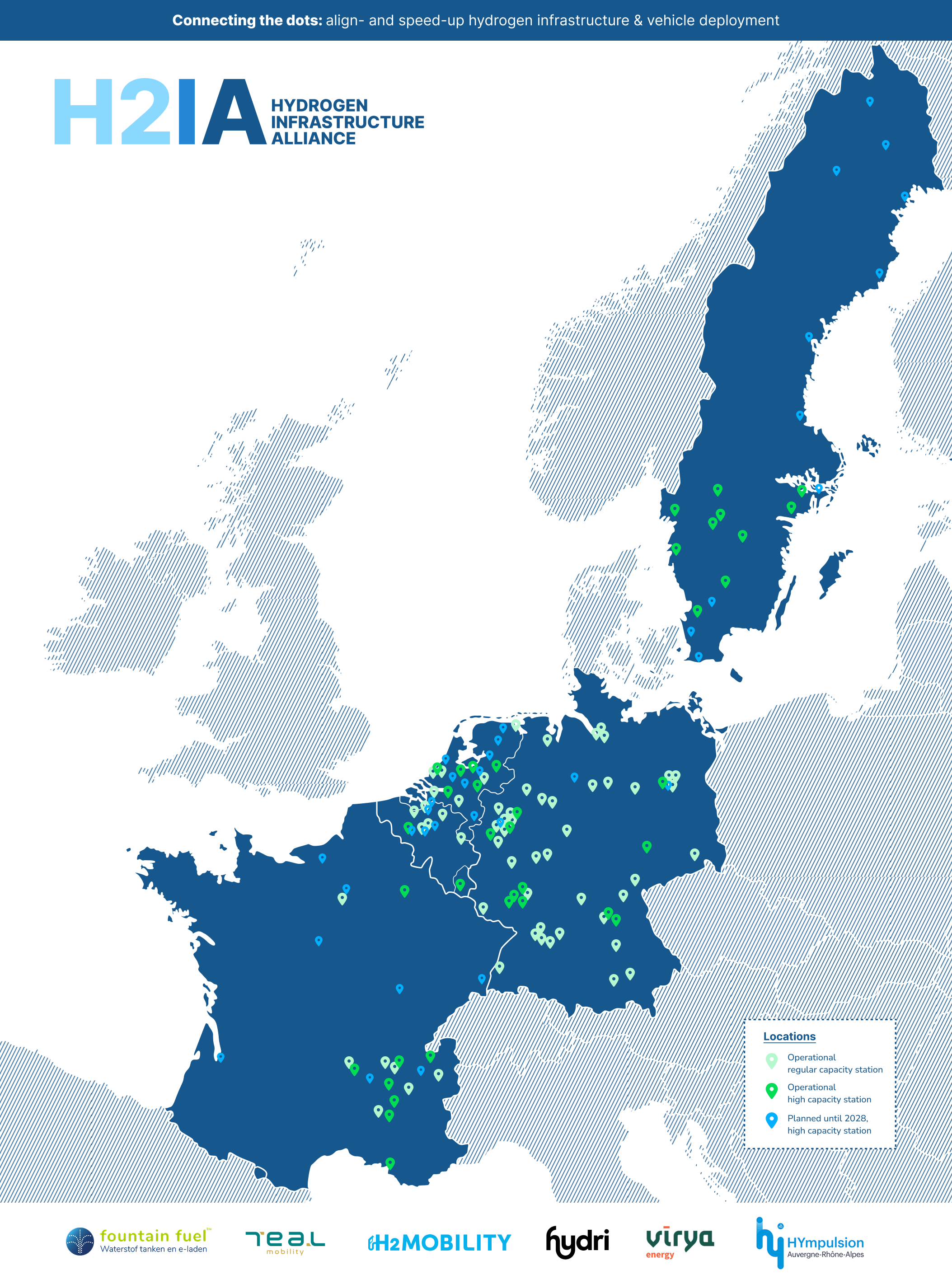 Connecting the dots
The rollout of hydrogen vehicles and refuelling stations mirrors how the build-out of mobile infrastructure and networks fueled the rapid rise of mobile phone use in the early 2000s. Transmission towers and good signal coverage led to a strong increase in mobile telephone use. In return, this led to the placement of more, and improved, transmission towers and ultimately to advancements such as the G5 networks. With high numbers of transmission towers, mobile phones and high utilizations rates the total costs of using the system decreased.
Hydrogen is alive & kicking
The potential for hydrogen vehicles is growing. “Our focus is on advancing the regulatory framework at the European level. Heavy-duty transport is a decisive driver of hydrogen mobility in Europe. We see this every day at our stations in Germany, where buses and trucks already account for well over 70 per cent of demand. It is essential that we continue on this path across Europe. The H2 Infrastructure Alliance sends an important signal in this respect: the development of a pan-European refuelling network is already well under way and now requires clear commitment from OEMs to increase vehicle numbers,” explains Martin Jüngel, Managing Director and CFO of H2 MOBILITY.
Hydrogen is complementary to battery-electric
The members of the H2IA stress that battery-electric and hydrogen are complementary techniques. Both technologies are needed to meet diverse customer needs – from long-haul transport and flexibility requirements, to ‘convoi exceptionnel’ transport and intensive operations. Hydrogen is particularly important in regions where electric grid capacity constrains the deployment of fast-charging infrastructure.
About H2 Infrastructure Alliance
The Hydrogen Infrastructure Alliance (H2IA) was founded by the leading EU-operators of hydrogen refuelling infrastructure: Hydri, H2 MOBILITY, Fountain Fuel, TEAL Mobility, HYmpulsion and Virya Energy. The alliance intents to coordinate and speed-up infrastructure and vehicle deployment efforts for hydrogen mobility until 2028. The goal is to realize a connected network of stations that cover Europe, which is what the alliance calls ‘Connecting the Dots’.
About H2 MOBILITY
H2 MOBILITY is a pioneer in the development of public hydrogen refuelling infrastructure and Europe’s largest operator of hydrogen refuelling stations. Its business areas include technical development, financing, planning, construction, marketing and operation of hydrogen stations. The company is also increasingly active in the services sector, offering consulting, station construction and operations, calibration, and quality assurance. Founded in 2015 as a project company to promote hydrogen as an emission-free fuel for road transport, H2 MOBILITY transitioned in 2022 into a long-term, commercially oriented enterprise. Its mission is to contribute to the energy transition in transport through high-performance hydrogen refuelling solutions. H2 MOBILITY aims to transition fully to renewable hydrogen by 2028.
Contact:
H2 MOBILITY: Daniela Dietz, presse@h2-mobility.de
Weitere Informationen unter www.h2-mobility.de
Connecting the dots
The rollout of hydrogen vehicles and refuelling stations mirrors how the build-out of mobile infrastructure and networks fueled the rapid rise of mobile phone use in the early 2000s. Transmission towers and good signal coverage led to a strong increase in mobile telephone use. In return, this led to the placement of more, and improved, transmission towers and ultimately to advancements such as the G5 networks. With high numbers of transmission towers, mobile phones and high utilizations rates the total costs of using the system decreased.
Hydrogen is alive & kicking
The potential for hydrogen vehicles is growing. “Our focus is on advancing the regulatory framework at the European level. Heavy-duty transport is a decisive driver of hydrogen mobility in Europe. We see this every day at our stations in Germany, where buses and trucks already account for well over 70 per cent of demand. It is essential that we continue on this path across Europe. The H2 Infrastructure Alliance sends an important signal in this respect: the development of a pan-European refuelling network is already well under way and now requires clear commitment from OEMs to increase vehicle numbers,” explains Martin Jüngel, Managing Director and CFO of H2 MOBILITY.
Hydrogen is complementary to battery-electric
The members of the H2IA stress that battery-electric and hydrogen are complementary techniques. Both technologies are needed to meet diverse customer needs – from long-haul transport and flexibility requirements, to ‘convoi exceptionnel’ transport and intensive operations. Hydrogen is particularly important in regions where electric grid capacity constrains the deployment of fast-charging infrastructure.
About H2 Infrastructure Alliance
The Hydrogen Infrastructure Alliance (H2IA) was founded by the leading EU-operators of hydrogen refuelling infrastructure: Hydri, H2 MOBILITY, Fountain Fuel, TEAL Mobility, HYmpulsion and Virya Energy. The alliance intents to coordinate and speed-up infrastructure and vehicle deployment efforts for hydrogen mobility until 2028. The goal is to realize a connected network of stations that cover Europe, which is what the alliance calls ‘Connecting the Dots’.
About H2 MOBILITY
H2 MOBILITY is a pioneer in the development of public hydrogen refuelling infrastructure and Europe’s largest operator of hydrogen refuelling stations. Its business areas include technical development, financing, planning, construction, marketing and operation of hydrogen stations. The company is also increasingly active in the services sector, offering consulting, station construction and operations, calibration, and quality assurance. Founded in 2015 as a project company to promote hydrogen as an emission-free fuel for road transport, H2 MOBILITY transitioned in 2022 into a long-term, commercially oriented enterprise. Its mission is to contribute to the energy transition in transport through high-performance hydrogen refuelling solutions. H2 MOBILITY aims to transition fully to renewable hydrogen by 2028.
Contact:
H2 MOBILITY: Daniela Dietz, presse@h2-mobility.de
Weitere Informationen unter www.h2-mobility.de 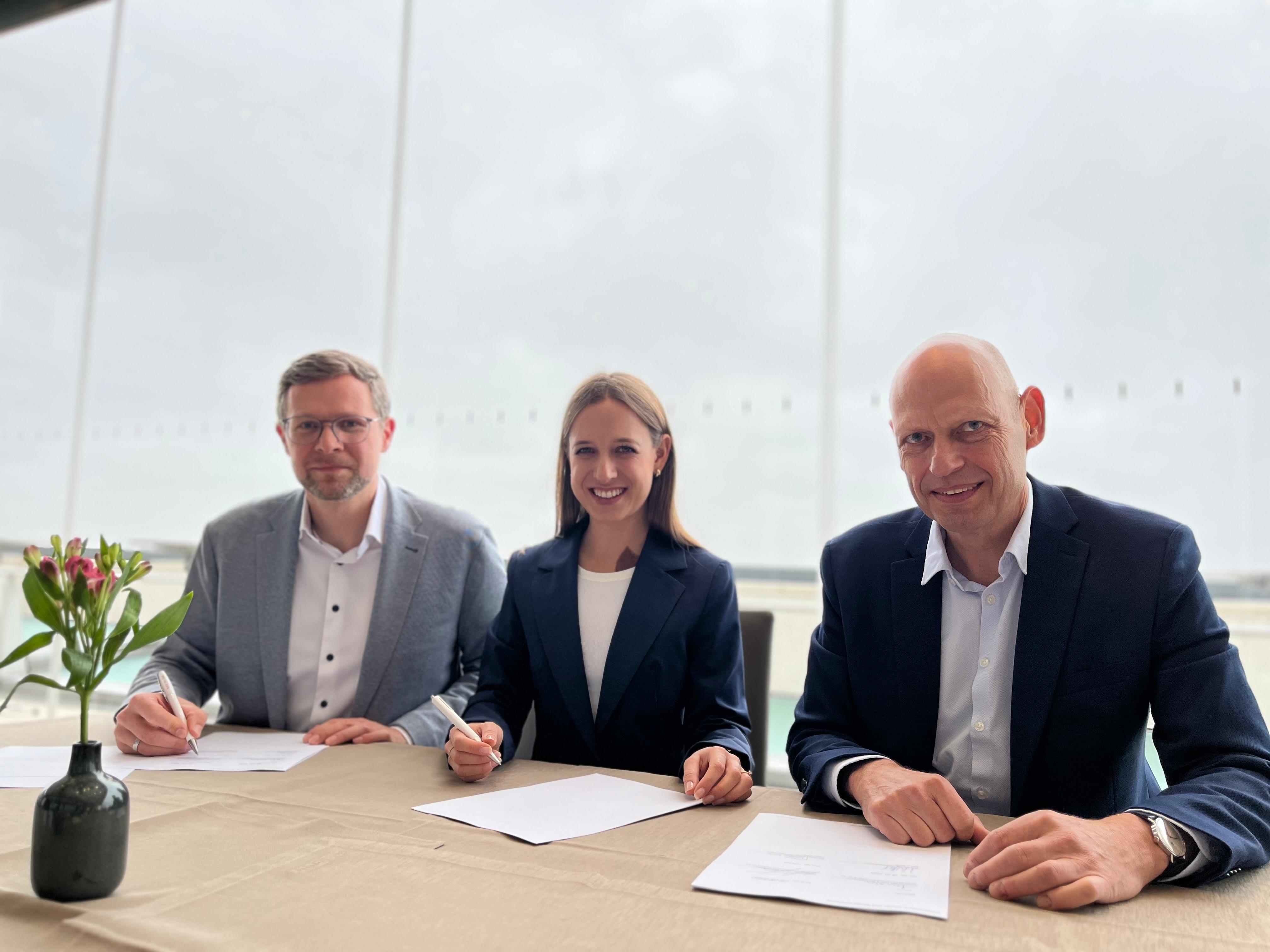 Cologne, 18 November 2025 | From 1 January 2026, hylane customers will be able to refuel at selected H2 MOBILITY hydrogen refuelling stations for around 8 euros (net) per kilogram. This is made possible by contractually secured offtake volumes, high-capacity stations and green hydrogen in combination with the greenhouse gas quota trading system. The new price marks a significant step towards the commercial viability of hydrogen trucks. The offer is available exclusively via the hylane fuel card and applies in Düsseldorf and the Rhine-Neckar region.
The reduced price is offered at large, high-performance H2 MOBILITY hydrogen refuelling stations in the two regions. These sites are located along major transport corridors and ensure cost-efficient and reliable refuelling for hydrogen trucks in daily operations. At roughly 8 euros per kilogram, the price is well below current market levels and brings the operation of fuel-cell trucks much closer to cost parity with diesel vehicles for the first time. Together with the extended toll exemption for zero-emission trucks until 2031, this represents a crucial step towards economically viable, low-carbon heavy-duty fleets.
Lower costs through guaranteed offtake volumes and consolidation
The new price level is the result of a strategic partnership: hylane pools the hydrogen demand of its fleet customers – including leading logistics and retail companies – and guarantees H2 MOBILITY consistently high offtake volumes. This planning security enables better utilisation of the stations and allows H2 MOBILITY to procure hydrogen strategically and cost-efficiently. The result is stable, reduced prices that support the economic operation of hydrogen trucks in everyday use.
Green hydrogen from regional production
At the participating stations in Düsseldorf and Rhine-Neckar, customers refuel exclusively with green hydrogen. It is produced locally via electrolysis using renewable energy and delivered to nearby stations by swap-body trailers. Short transport distances between production sites and hydrogen refuelling stations reduce costs and improve the CO2 balance across the value chain. Policy instruments such as greenhouse gas quota trading and RFNBO certification (Renewable Fuels of Non-Biological Origin) under the European Renewable Energy Directive RED III create further incentives for the use of renewable fuels, actively promoting the expansion of green hydrogen infrastructure. As early as 2024, around one-third of the hydrogen refuelling stations used by hylane were already supplying green hydrogen – with the trend rising.
CO2 reporting included
hylane’s fuel-cell trucks operate with zero emissions in use (“tank-to-wheel”). Emissions arise only in upstream processes such as production, transport and provision of hydrogen (“well-to-tank”). By using 100 % green hydrogen, CO2 emissions can be reduced by up to 90 % compared with diesel trucks – from fuel production through to road operation (“well-to-wheel”). hylane customers receive CO2 reports verified by DEKRA. These reports are recognised by auditors and can be used in sustainability reporting in line with the EU Corporate Sustainability Reporting Directive (CSRD). This makes the climate impact of the deployed vehicles transparent, traceable and verifiable.
A strong signal for the industry
The cooperation between hylane, one of Europe’s leading providers of zero-emission trucks, and H2 MOBILITY, the continent’s largest operator of public hydrogen refuelling stations, sends a clear message about the viability of hydrogen mobility. The reduced price supports companies in decarbonising their fleets sustainably and economically—a decisive contribution to scaling up climate-friendly heavy-duty transport.
Dr Sara Schiffer, Managing Director, hylane: “Setting the price at around 8 euros per kilogram marks an important milestone. It demonstrates that hydrogen trucks are not only environmentally sound but also economically viable. This is a crucial step towards decarbonising heavy road freight and accelerating the growth of the hydrogen economy—well beyond the transport sector.”
Martin Jüngel, Managing Director and CFO, H2 MOBILITY: “Through close cooperation along the hydrogen value chain, we are proving that the economic operation of hydrogen trucks is already feasible in practice today. We repeatedly highlight the importance of long-term political frameworks for the commercial use of green hydrogen. We are delighted to demonstrate this in practice for the first time. Only then can infrastructure operators, vehicle providers and customers gain the necessary confidence to switch to sustainable transport and mobility solutions.”
About hylane
hylane is among Europe’s leading providers of zero-emission trucks. Founded in Cologne in 2021 as Germany’s first zero-emission commercial vehicle rental company, its mission is to support businesses in decarbonising their truck fleets. hylane supplies battery-electric and hydrogen-powered vehicles from various manufacturers through a comprehensive usage-based rental model; customers pay only for the kilometres driven. hylane manages vehicle procurement and registration, maintenance and repairs, insurance, access to energy supply and regulatory compliance, including CO₂ certification. hylane makes the transition to climate-friendly trucks not only efficient and cost-effective, but also significantly easier. Leading fleet operators from logistics, retail and industry already rely on hylane as a strategic partner for fleet decarbonisation.
About H2 MOBILITY
H2 MOBILITY is a pioneer in the development of public hydrogen refuelling infrastructure and Europe’s largest operator of hydrogen refuelling stations. Its business areas include technical development, financing, planning, construction, marketing and operation of hydrogen stations. The company is also increasingly active in the services sector, offering consulting, station construction and operations, calibration, and quality assurance. Founded in 2015 as a project company to promote hydrogen as an emission-free fuel for road transport, H2 MOBILITY transitioned in 2022 into a long-term, commercially oriented enterprise. Its mission is to contribute to the energy transition in transport through high-performance hydrogen refuelling solutions. H2 MOBILITY aims to transition fully to renewable hydrogen by 2028.
Contact:
hylane: Weena Ghosh, presse@hylane.de
H2 MOBILITY: Daniela Dietz, presse@h2-mobility.de
Image: Copyright (c) H2 MOBILITY; from left to right:
Cologne, 18 November 2025 | From 1 January 2026, hylane customers will be able to refuel at selected H2 MOBILITY hydrogen refuelling stations for around 8 euros (net) per kilogram. This is made possible by contractually secured offtake volumes, high-capacity stations and green hydrogen in combination with the greenhouse gas quota trading system. The new price marks a significant step towards the commercial viability of hydrogen trucks. The offer is available exclusively via the hylane fuel card and applies in Düsseldorf and the Rhine-Neckar region.
The reduced price is offered at large, high-performance H2 MOBILITY hydrogen refuelling stations in the two regions. These sites are located along major transport corridors and ensure cost-efficient and reliable refuelling for hydrogen trucks in daily operations. At roughly 8 euros per kilogram, the price is well below current market levels and brings the operation of fuel-cell trucks much closer to cost parity with diesel vehicles for the first time. Together with the extended toll exemption for zero-emission trucks until 2031, this represents a crucial step towards economically viable, low-carbon heavy-duty fleets.
Lower costs through guaranteed offtake volumes and consolidation
The new price level is the result of a strategic partnership: hylane pools the hydrogen demand of its fleet customers – including leading logistics and retail companies – and guarantees H2 MOBILITY consistently high offtake volumes. This planning security enables better utilisation of the stations and allows H2 MOBILITY to procure hydrogen strategically and cost-efficiently. The result is stable, reduced prices that support the economic operation of hydrogen trucks in everyday use.
Green hydrogen from regional production
At the participating stations in Düsseldorf and Rhine-Neckar, customers refuel exclusively with green hydrogen. It is produced locally via electrolysis using renewable energy and delivered to nearby stations by swap-body trailers. Short transport distances between production sites and hydrogen refuelling stations reduce costs and improve the CO2 balance across the value chain. Policy instruments such as greenhouse gas quota trading and RFNBO certification (Renewable Fuels of Non-Biological Origin) under the European Renewable Energy Directive RED III create further incentives for the use of renewable fuels, actively promoting the expansion of green hydrogen infrastructure. As early as 2024, around one-third of the hydrogen refuelling stations used by hylane were already supplying green hydrogen – with the trend rising.
CO2 reporting included
hylane’s fuel-cell trucks operate with zero emissions in use (“tank-to-wheel”). Emissions arise only in upstream processes such as production, transport and provision of hydrogen (“well-to-tank”). By using 100 % green hydrogen, CO2 emissions can be reduced by up to 90 % compared with diesel trucks – from fuel production through to road operation (“well-to-wheel”). hylane customers receive CO2 reports verified by DEKRA. These reports are recognised by auditors and can be used in sustainability reporting in line with the EU Corporate Sustainability Reporting Directive (CSRD). This makes the climate impact of the deployed vehicles transparent, traceable and verifiable.
A strong signal for the industry
The cooperation between hylane, one of Europe’s leading providers of zero-emission trucks, and H2 MOBILITY, the continent’s largest operator of public hydrogen refuelling stations, sends a clear message about the viability of hydrogen mobility. The reduced price supports companies in decarbonising their fleets sustainably and economically—a decisive contribution to scaling up climate-friendly heavy-duty transport.
Dr Sara Schiffer, Managing Director, hylane: “Setting the price at around 8 euros per kilogram marks an important milestone. It demonstrates that hydrogen trucks are not only environmentally sound but also economically viable. This is a crucial step towards decarbonising heavy road freight and accelerating the growth of the hydrogen economy—well beyond the transport sector.”
Martin Jüngel, Managing Director and CFO, H2 MOBILITY: “Through close cooperation along the hydrogen value chain, we are proving that the economic operation of hydrogen trucks is already feasible in practice today. We repeatedly highlight the importance of long-term political frameworks for the commercial use of green hydrogen. We are delighted to demonstrate this in practice for the first time. Only then can infrastructure operators, vehicle providers and customers gain the necessary confidence to switch to sustainable transport and mobility solutions.”
About hylane
hylane is among Europe’s leading providers of zero-emission trucks. Founded in Cologne in 2021 as Germany’s first zero-emission commercial vehicle rental company, its mission is to support businesses in decarbonising their truck fleets. hylane supplies battery-electric and hydrogen-powered vehicles from various manufacturers through a comprehensive usage-based rental model; customers pay only for the kilometres driven. hylane manages vehicle procurement and registration, maintenance and repairs, insurance, access to energy supply and regulatory compliance, including CO₂ certification. hylane makes the transition to climate-friendly trucks not only efficient and cost-effective, but also significantly easier. Leading fleet operators from logistics, retail and industry already rely on hylane as a strategic partner for fleet decarbonisation.
About H2 MOBILITY
H2 MOBILITY is a pioneer in the development of public hydrogen refuelling infrastructure and Europe’s largest operator of hydrogen refuelling stations. Its business areas include technical development, financing, planning, construction, marketing and operation of hydrogen stations. The company is also increasingly active in the services sector, offering consulting, station construction and operations, calibration, and quality assurance. Founded in 2015 as a project company to promote hydrogen as an emission-free fuel for road transport, H2 MOBILITY transitioned in 2022 into a long-term, commercially oriented enterprise. Its mission is to contribute to the energy transition in transport through high-performance hydrogen refuelling solutions. H2 MOBILITY aims to transition fully to renewable hydrogen by 2028.
Contact:
hylane: Weena Ghosh, presse@hylane.de
H2 MOBILITY: Daniela Dietz, presse@h2-mobility.de
Image: Copyright (c) H2 MOBILITY; from left to right:
- Martin Jüngel, Managing Director, H2 MOBILITY,
- Dr Sara Schiffer, Managing Director, hylane
- Frank Fronzke, Managing Director, H2 MOBILITY, during the contract signing
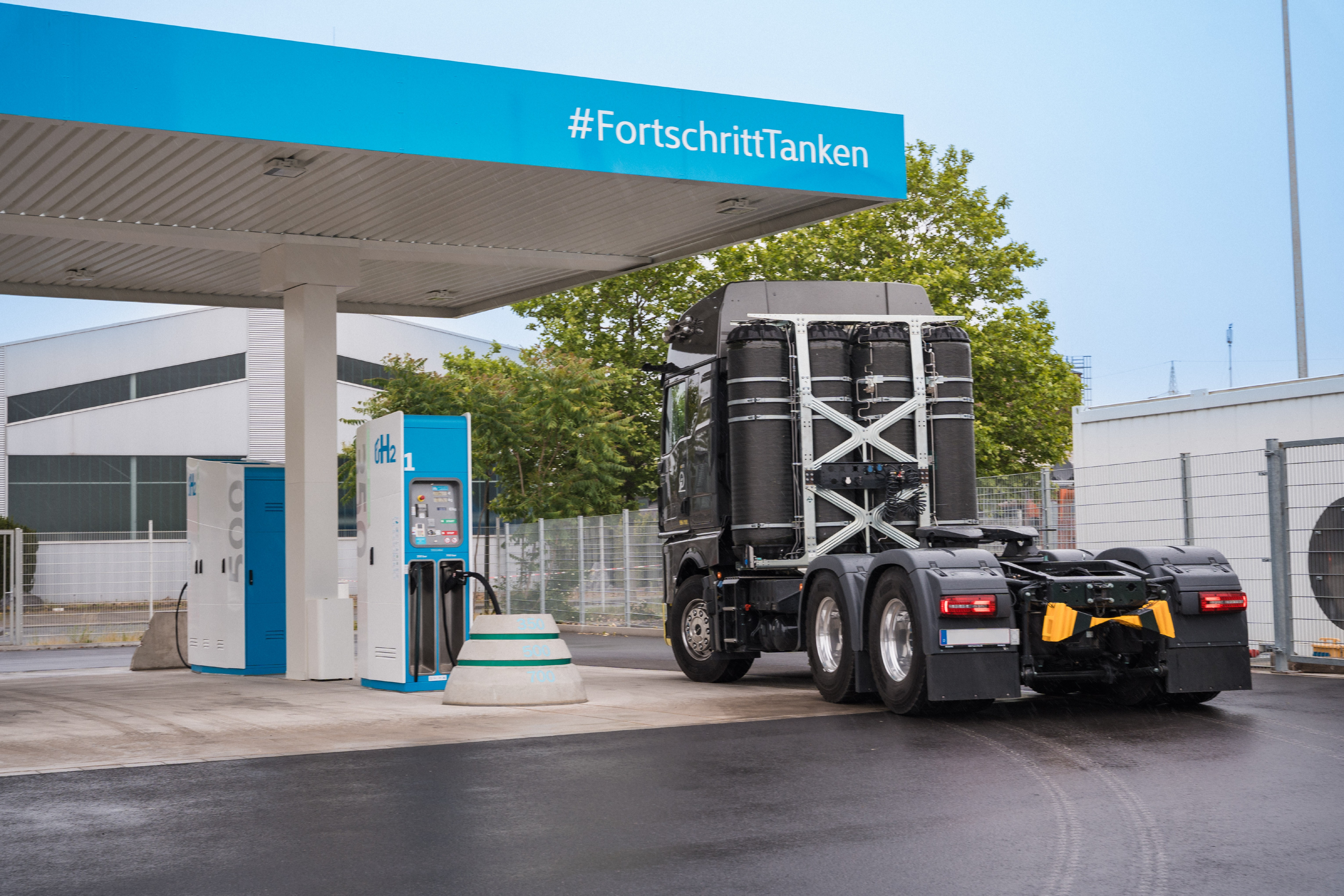 Berlin, 10 November 2025 | The company reaffirms its focus on high-performance hydrogen refuelling stations for both light and heavy-duty vehicles and continues to make progress in its crucial transformation process to provide robust and efficient refuelling for commercial vehicles such as buses, trucks and waste collection vehicles.
H2 MOBILITY will decommission its stations in Berlin-Rothenbachstraße, Biebelried, Braunschweig, Duisburg, Essen, Hasbergen, Ingolstadt, Kirchheim, Laatzen, Limburg, Lohfelden, Metzingen, Rheda-Wiedenbrück and Wendlingen as of 31 December 2025. Customers will be able to refuel at these locations until the end of December, after which the stations will be closed and dismantled.
“The stations that marked the beginning of hydrogen mobility more than ten years ago can no longer be adapted to today’s changing technical standards and growing requirements. They have limited storage capacity and, from today’s perspective, insufficient performance for commercial vehicle operations. These stations were originally built for a passenger car market that has not developed as expected in recent years,” said Martin Jüngel, Managing Director and CFO of H2 MOBILITY. “In parallel, we are investing in more powerful and future-oriented stations, a new generation of hydrogen refuelling stations. They feature significantly higher performance and resilience, enabling refuelling of buses and trucks with 350-bar tank systems in less than 15 minutes.”
Focus on H2 clusters and high-performance stations
Since 2022, H2 MOBILITY’s strategic direction has been guided by regional, demand-based expansion for light and heavy-duty vehicles (350 bar) – particularly trucks and buses. The company is concentrating on regional hydrogen clusters in areas with high demand.
H2 MOBILITY has been operating four new-generation stations since 2024 in the key regions of Rhine-Neckar and Rhine-Ruhr. In December, another station of this type will open in Ludwigshafen (Rhineland-Palatinate), focused on serving buses, waste collection vehicles and trucks.The new generation of stations represents an increase in the number of dispensers, larger hydrogen delivery volumes supplied via a trailer system, and substantially more powerful technology, partly developed in-house by H2 MOBILITY. These stations support high vehicle throughput and meet the specific requirements of commercial fleets. With the completion of this transformation process, the hydrogen infrastructure will be fully aligned with the current and future demands of the commercial vehicle market.
About H2 MOBILITY
H2 MOBILITY is a pioneer in the development of public hydrogen refuelling infrastructure and Europe’s largest operator of hydrogen refuelling stations. Its business areas include technical development, financing, planning, construction, marketing and operation of hydrogen stations. The company is also increasingly active in the services sector, offering consulting, station construction and operations, calibration, and quality assurance. Founded in 2015 as a project company to promote hydrogen as an emission-free fuel for road transport, H2 MOBILITY transitioned in 2022 into a long-term, commercially oriented enterprise. Its mission is to contribute to the energy transition in transport through high-performance hydrogen refuelling solutions. H2 MOBILITY aims to transition fully to renewable hydrogen by 2028.
Contact:
Daniela Dietz, presse@h2-mobility.de
Further information available at www.h2-mobility.de
Berlin, 10 November 2025 | The company reaffirms its focus on high-performance hydrogen refuelling stations for both light and heavy-duty vehicles and continues to make progress in its crucial transformation process to provide robust and efficient refuelling for commercial vehicles such as buses, trucks and waste collection vehicles.
H2 MOBILITY will decommission its stations in Berlin-Rothenbachstraße, Biebelried, Braunschweig, Duisburg, Essen, Hasbergen, Ingolstadt, Kirchheim, Laatzen, Limburg, Lohfelden, Metzingen, Rheda-Wiedenbrück and Wendlingen as of 31 December 2025. Customers will be able to refuel at these locations until the end of December, after which the stations will be closed and dismantled.
“The stations that marked the beginning of hydrogen mobility more than ten years ago can no longer be adapted to today’s changing technical standards and growing requirements. They have limited storage capacity and, from today’s perspective, insufficient performance for commercial vehicle operations. These stations were originally built for a passenger car market that has not developed as expected in recent years,” said Martin Jüngel, Managing Director and CFO of H2 MOBILITY. “In parallel, we are investing in more powerful and future-oriented stations, a new generation of hydrogen refuelling stations. They feature significantly higher performance and resilience, enabling refuelling of buses and trucks with 350-bar tank systems in less than 15 minutes.”
Focus on H2 clusters and high-performance stations
Since 2022, H2 MOBILITY’s strategic direction has been guided by regional, demand-based expansion for light and heavy-duty vehicles (350 bar) – particularly trucks and buses. The company is concentrating on regional hydrogen clusters in areas with high demand.
H2 MOBILITY has been operating four new-generation stations since 2024 in the key regions of Rhine-Neckar and Rhine-Ruhr. In December, another station of this type will open in Ludwigshafen (Rhineland-Palatinate), focused on serving buses, waste collection vehicles and trucks.The new generation of stations represents an increase in the number of dispensers, larger hydrogen delivery volumes supplied via a trailer system, and substantially more powerful technology, partly developed in-house by H2 MOBILITY. These stations support high vehicle throughput and meet the specific requirements of commercial fleets. With the completion of this transformation process, the hydrogen infrastructure will be fully aligned with the current and future demands of the commercial vehicle market.
About H2 MOBILITY
H2 MOBILITY is a pioneer in the development of public hydrogen refuelling infrastructure and Europe’s largest operator of hydrogen refuelling stations. Its business areas include technical development, financing, planning, construction, marketing and operation of hydrogen stations. The company is also increasingly active in the services sector, offering consulting, station construction and operations, calibration, and quality assurance. Founded in 2015 as a project company to promote hydrogen as an emission-free fuel for road transport, H2 MOBILITY transitioned in 2022 into a long-term, commercially oriented enterprise. Its mission is to contribute to the energy transition in transport through high-performance hydrogen refuelling solutions. H2 MOBILITY aims to transition fully to renewable hydrogen by 2028.
Contact:
Daniela Dietz, presse@h2-mobility.de
Further information available at www.h2-mobility.de  Berlin, 9 September 2025 | H2 MOBILITY is now offering a GHG quota service for operators of hydrogen refuelling stations in Germany. Through this service, the company provides third parties with access to the GHG quota trading system, consolidates and sells avoided greenhouse gas emissions, and ensures legally compliant documentation. This enables market access and guarantees non-discriminatory participation for all providers.
The trading of greenhouse gas savings (GHG reductions) is complex and challenging for many hydrogen refuelling station operators. Strict regulatory requirements, time-consuming verification procedures, and volatile market mechanisms make participation resource-intensive. In addition, minimum thresholds for GHG reductions often restrict access to the market.
H2 MOBILITY’s service covers the secure, year-round marketing of emission savings, timely and legally compliant documentation, regular price updates, and a modular service structure. A key feature is the aggregation of GHG reductions from multiple operators, and the strategic timing of sales to strengthen negotiating power. This approach enables participation for operators who have previously been excluded from the GHG market due to limited expertise or insufficient volumes.
“Our GHG quota service eases the burden for hydrogen refuelling station operators. As a reliable partner, we handle market access, documentation and sales. This enables maximum returns with minimal effort while supporting the expansion of hydrogen infrastructure,” says Martin Jüngel, Managing Director and CFO of H2 MOBILITY.
This new business area strengthens H2 MOBILITY’s position as the largest operator of hydrogen refuelling stations in Europe. The initiative is part of the company’s overarching strategy to provide innovative solutions across the hydrogen value chain, fostering efficiency and sustainability while driving the scale-up of hydrogen mobility.
GHG Quota Trading
The GHG quota trading system is a government tool designed to promote sustainable mobility. It requires oil companies to gradually reduce their CO₂ emissions or purchase corresponding certificates. Operators of hydrogen refuelling stations and other renewable energy sources in the transport sector can benefit by selling their avoided greenhouse gas emissions as certificates to quota-obligated entities. This mechanism creates financial incentives for climate-friendly technologies and makes a significant contribution to cutting CO₂ emissions.
Certificate prices are determined by supply and demand, as well as by regulatory frameworks, with steadily rising GHG reduction targets playing a central role. The potential for providers such as hydrogen refuelling station operators is considerable and is expected to increase further with upcoming regulatory changes, such as the planned introduction of a sub-quota for renewable fuels of non-biological origin (RFNBOs).
Further information on the GHG quota service and a contact form for an initial consultation are available at: https://go.h2-mobility.de/thg (German).
About H2 MOBILITY
H2 MOBILITY is a pioneer in the development of public hydrogen refuelling infrastructure and Europe’s largest operator of hydrogen refuelling stations. Its business areas include technical development, financing, planning, construction, marketing and operation of hydrogen stations. The company is also increasingly active in the services sector, offering consulting, station construction and operations, calibration, and quality assurance. Founded in 2015 as a project company to promote hydrogen as an emission-free fuel for road transport, H2 MOBILITY transitioned in 2022 into a long-term, commercially oriented enterprise. Its mission is to contribute to the energy transition in transport through high-performance hydrogen refuelling solutions. H2 MOBILITY aims to transition fully to renewable hydrogen by 2028.
Contact:
Daniela Dietz, presse@h2-mobility.de
Further information available at www.h2-mobility.de
Berlin, 9 September 2025 | H2 MOBILITY is now offering a GHG quota service for operators of hydrogen refuelling stations in Germany. Through this service, the company provides third parties with access to the GHG quota trading system, consolidates and sells avoided greenhouse gas emissions, and ensures legally compliant documentation. This enables market access and guarantees non-discriminatory participation for all providers.
The trading of greenhouse gas savings (GHG reductions) is complex and challenging for many hydrogen refuelling station operators. Strict regulatory requirements, time-consuming verification procedures, and volatile market mechanisms make participation resource-intensive. In addition, minimum thresholds for GHG reductions often restrict access to the market.
H2 MOBILITY’s service covers the secure, year-round marketing of emission savings, timely and legally compliant documentation, regular price updates, and a modular service structure. A key feature is the aggregation of GHG reductions from multiple operators, and the strategic timing of sales to strengthen negotiating power. This approach enables participation for operators who have previously been excluded from the GHG market due to limited expertise or insufficient volumes.
“Our GHG quota service eases the burden for hydrogen refuelling station operators. As a reliable partner, we handle market access, documentation and sales. This enables maximum returns with minimal effort while supporting the expansion of hydrogen infrastructure,” says Martin Jüngel, Managing Director and CFO of H2 MOBILITY.
This new business area strengthens H2 MOBILITY’s position as the largest operator of hydrogen refuelling stations in Europe. The initiative is part of the company’s overarching strategy to provide innovative solutions across the hydrogen value chain, fostering efficiency and sustainability while driving the scale-up of hydrogen mobility.
GHG Quota Trading
The GHG quota trading system is a government tool designed to promote sustainable mobility. It requires oil companies to gradually reduce their CO₂ emissions or purchase corresponding certificates. Operators of hydrogen refuelling stations and other renewable energy sources in the transport sector can benefit by selling their avoided greenhouse gas emissions as certificates to quota-obligated entities. This mechanism creates financial incentives for climate-friendly technologies and makes a significant contribution to cutting CO₂ emissions.
Certificate prices are determined by supply and demand, as well as by regulatory frameworks, with steadily rising GHG reduction targets playing a central role. The potential for providers such as hydrogen refuelling station operators is considerable and is expected to increase further with upcoming regulatory changes, such as the planned introduction of a sub-quota for renewable fuels of non-biological origin (RFNBOs).
Further information on the GHG quota service and a contact form for an initial consultation are available at: https://go.h2-mobility.de/thg (German).
About H2 MOBILITY
H2 MOBILITY is a pioneer in the development of public hydrogen refuelling infrastructure and Europe’s largest operator of hydrogen refuelling stations. Its business areas include technical development, financing, planning, construction, marketing and operation of hydrogen stations. The company is also increasingly active in the services sector, offering consulting, station construction and operations, calibration, and quality assurance. Founded in 2015 as a project company to promote hydrogen as an emission-free fuel for road transport, H2 MOBILITY transitioned in 2022 into a long-term, commercially oriented enterprise. Its mission is to contribute to the energy transition in transport through high-performance hydrogen refuelling solutions. H2 MOBILITY aims to transition fully to renewable hydrogen by 2028.
Contact:
Daniela Dietz, presse@h2-mobility.de
Further information available at www.h2-mobility.de 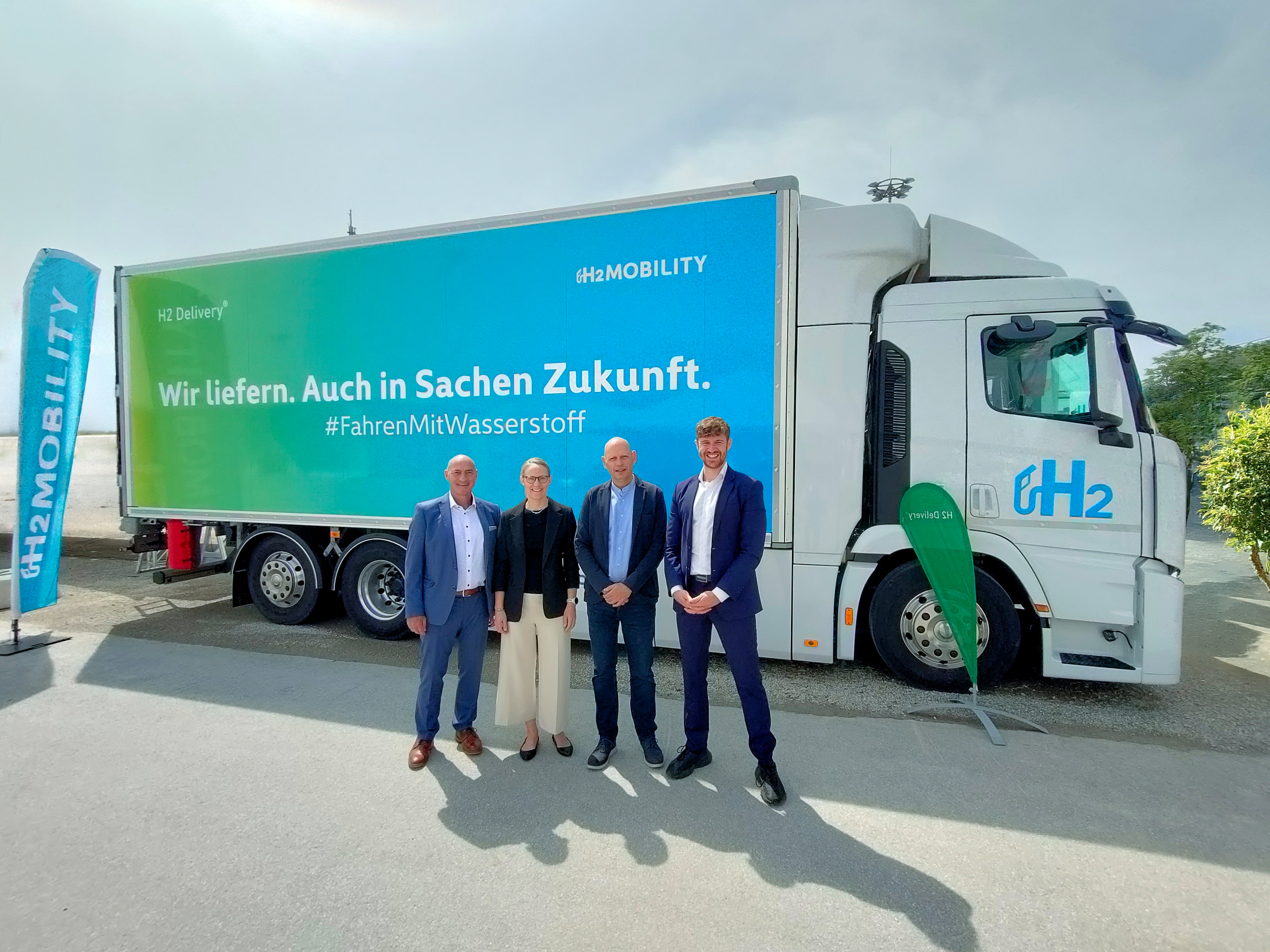 Hamburg, 21 July 2025 | The HOYER Group has concluded a contract with H2 MOBILITY, the largest operator of hydrogen refuelling stations in Germany. Initially, as a partner, the international logistics specialist for liquid goods will undertake supplies to hydrogen refuelling stations in the Rhein-Neckar region, and will be responsible both for transport and for quantity control.
The international logistics specialist HOYER, by taking this step, strengthens its position as a leading provider in Germany in the field of gas logistics. The HOYER Group is continuously expanding the hydrogen sector, both with logistics expertise and by building up its own hydrogen fleet. Investments and market growth will be guided in an internal New Energies focus group, which deals in detail with equipment and the provision of services in the H2 sector.
Anna Krüger, Head of Sales for Global Gas Logistics and a member of the HOYER Group’s New Energies focus group, says, “We are very pleased with the signature of this contract, through which we can contribute our many years of experience, both in handling hydrogen and in intelligent logistics planning. The partnership with H2 MOBILITY is an important milestone in our mission to further expand the hydrogen logistics sector, thus supporting the transition to environmentally friendly mobility. HOYER is also already acquiring experience with its first fuel cell trucks.”
Frank Fronzke, Managing Director and COO of H2 MOBILITY, says, “We are delighted to have gained HOYER as a reliable partner who will support us in strengthening independent supplies to our hydrogen refuelling stations. By assigning a logistics partner, we create more autonomy and security in supplies to our refuelling stations. At the same time, we have invested in our own hydrogen equipment, so together with HOYER we can now implement more flexible deliveries to our refueling stations.”
About H2 MOBILITY
H2 MOBILITY is the pioneer in developing a public hydrogen refuelling infrastructure, and is Germany’s largest operator of hydrogen refuelling stations. The company is committed to promoting sustainable mobility, and has set itself the aim of switching fully to renewable hydrogen by 2028.
About the HOYER Group
HOYER is a leading global logistics provider in handling and transporting liquid goods, including gases. With decades of experience and a comprehensive portfolio of services, HOYER offers tailor-made solutions for cryogenic liquified gases or gases liquified under pressure, and in handling gas cylinders. Worldwide.
Contact:
H2 MOBILITY: Daniela Dietz, presse@h2-mobility.de
Further information at www.h2-mobility.de
Image: Copyright (c) H2 MOBILITY; from left to right:
– Axel Remplewski, Managing Director, HOYER Global Gas Logistics
– Anna Krüger, Head of Sales Global Gas Logistics, HOYER Group
– Frank Fronzke, Managing Director and Chief Operating Officer (COO), H2 MOBILITY
– Eike Diercks, H2 Sourcing & Logistic Manager, H2 MOBILITY
Hamburg, 21 July 2025 | The HOYER Group has concluded a contract with H2 MOBILITY, the largest operator of hydrogen refuelling stations in Germany. Initially, as a partner, the international logistics specialist for liquid goods will undertake supplies to hydrogen refuelling stations in the Rhein-Neckar region, and will be responsible both for transport and for quantity control.
The international logistics specialist HOYER, by taking this step, strengthens its position as a leading provider in Germany in the field of gas logistics. The HOYER Group is continuously expanding the hydrogen sector, both with logistics expertise and by building up its own hydrogen fleet. Investments and market growth will be guided in an internal New Energies focus group, which deals in detail with equipment and the provision of services in the H2 sector.
Anna Krüger, Head of Sales for Global Gas Logistics and a member of the HOYER Group’s New Energies focus group, says, “We are very pleased with the signature of this contract, through which we can contribute our many years of experience, both in handling hydrogen and in intelligent logistics planning. The partnership with H2 MOBILITY is an important milestone in our mission to further expand the hydrogen logistics sector, thus supporting the transition to environmentally friendly mobility. HOYER is also already acquiring experience with its first fuel cell trucks.”
Frank Fronzke, Managing Director and COO of H2 MOBILITY, says, “We are delighted to have gained HOYER as a reliable partner who will support us in strengthening independent supplies to our hydrogen refuelling stations. By assigning a logistics partner, we create more autonomy and security in supplies to our refuelling stations. At the same time, we have invested in our own hydrogen equipment, so together with HOYER we can now implement more flexible deliveries to our refueling stations.”
About H2 MOBILITY
H2 MOBILITY is the pioneer in developing a public hydrogen refuelling infrastructure, and is Germany’s largest operator of hydrogen refuelling stations. The company is committed to promoting sustainable mobility, and has set itself the aim of switching fully to renewable hydrogen by 2028.
About the HOYER Group
HOYER is a leading global logistics provider in handling and transporting liquid goods, including gases. With decades of experience and a comprehensive portfolio of services, HOYER offers tailor-made solutions for cryogenic liquified gases or gases liquified under pressure, and in handling gas cylinders. Worldwide.
Contact:
H2 MOBILITY: Daniela Dietz, presse@h2-mobility.de
Further information at www.h2-mobility.de
Image: Copyright (c) H2 MOBILITY; from left to right:
– Axel Remplewski, Managing Director, HOYER Global Gas Logistics
– Anna Krüger, Head of Sales Global Gas Logistics, HOYER Group
– Frank Fronzke, Managing Director and Chief Operating Officer (COO), H2 MOBILITY
– Eike Diercks, H2 Sourcing & Logistic Manager, H2 MOBILITY  Düsseldorf, July 01 2025 | Air Liquide and H2 MOBILITY, hydrogen refuelling stations network operator, signed a multi-year supply contract for renewable hydrogen in the Rhine-Ruhr region, in Germany. This framework agreement marks a milestone for climate-neutral mobility in the industrial heart of North Rhine-Westphalia.
As part of this agreement, Air Liquide will supply existing and future hydrogen refuelling stations of H2 MOBILITY for trucks and buses in the Rhine-Ruhr region with renewable hydrogen. The RFNBO*-certified hydrogen will come from Air Liquide’s “Trailblazer” electrolyzer in Oberhausen. The supply contract has a volume of up to 1,000 tons per year. This step underlines Air Liquide’s contribution to developing the sustainable transportation sector in Germany.
This is a significant step for the decarbonization of transport in the Rhine-Ruhr region and makes a substantial contribution to achieving national climate goals. The framework agreement reinforces Air Liquide’s position as an important enabler of the hydrogen economy in Germany and once again shows that these goals can only be achieved through strong partnerships.
At the beginning of 2025, the German Federal Environment Agency recognized the certification of RFNBO in accordance with the systems approved by the European Commission. Subsequently, in April 2025, Air Liquide was the first company in Germany to receive official certification based on the ISCC EU certification scheme for the 20 MW electrolyzer in Oberhausen.
Oliver Meier, Director Hydrogen Energy Central Europe at Air Liquide, says: “Together with H2 MOBILITY, we are committed to decarbonizing heavy-duty transport in the Rhine-Ruhr area. As a key operator in the hydrogen value chain, our mission is to accompany our customers, including long-standing partners like H2 MOBILITY, on their journey to make this a concrete reality. This commitment shows Air Liquide’s ability to manage the entire supply chain – from the production of certified renewable hydrogen to the supply of the refuelling station – cost-effectively and reliably.”
Frank Fronzke, Managing Director and Chief Operating Officer (COO) of H2 MOBILITY, explains: “By 2028, we want to operate all H2 MOBILITY refuelling stations with renewable hydrogen. The contract with Air Liquide brings us a significant step closer to this ambitious goal in the Rhine-Ruhr region. Renewable hydrogen is a crucial element in our mission to make the transport sector more sustainable. Thanks to our agreement, the first hydrogen refuelling stations in the Rhine-Ruhr region will already be offering certified renewable hydrogen to our customers this summer.”
*Renewable Fuel of Non-Biological Origin
About Trailblazer
The electrolyzer is the largest production facility for climate-neutral hydrogen in Germany, connected to an existing infrastructure. With a production capacity of up to 2,900 tons of renewable hydrogen per year, it makes a significant contribution to the energy transition and serves as a backbone for key industries such as steel, chemicals, and refining, as well as for mobility. The location in the industrial heart of the Ruhr region facilitates the supply of renewable hydrogen to major customers. Through its integration into Air Liquide’s existing hydrogen pipeline, this pioneering project will make a decisive contribution to the development of a sustainable hydrogen economy in Germany.
About Air Liquide
Air Liquide is a world leader in gases, technologies and services for industry and healthcare. Present in 60 countries with approximately 66,500 employees, the Group serves more than 4 million customers and patients. Oxygen, nitrogen and hydrogen are essential small molecules for life, matter and energy. They embody Air Liquide’s scientific territory and have been at the core of the Group’s activities since its creation in 1902. Taking action today while preparing the future is at the heart of Air Liquide’s strategy. With ADVANCE, its strategic plan, Air Liquide is targeting a global performance, combining financial and extra-financial dimensions. Positioned on new markets, the Group benefits from major assets such as its business model combining resilience and strength, its ability to innovate and its technological expertise. The Group develops solutions contributing to climate and the energy transition — particularly with hydrogen — and takes action to progress in areas of healthcare, electronics and high technologies. Air Liquide’s revenue amounted to more than 27 billion euros in 2024. Air Liquide is listed on the Euronext Paris stock exchange (compartment A) and belongs to the CAC 40, CAC 40 ESG, EURO STOXX 50, FTSE4Good and DJSI Europe indexes.
About H2 MOBILITY
H2 MOBILITY is a pioneer in the development of public hydrogen refuelling infrastructure and Europe’s largest operator of hydrogen refuelling stations. Its areas of business include technical development, financing, planning, construction, marketing and operation of hydrogen stations. The company is also increasingly active in the services sector, offering consulting, station construction and operations, calibration and quality assurance. Founded in 2015 as a project company to promote hydrogen as an emission-free fuel for road transport, H2 MOBILITY transitioned in 2022 into a long-term, commercially focused enterprise. Its mission is to contribute to the energy transition in transport through high-performance hydrogen refuelling solutions. H2 MOBILITY aims to transition fully to renewable hydrogen by 2028. Air Liquide is one of the founding partners of H2 MOBILITY, together with other Joint Venture partners.
Contact:
Air Liquide: Sarah Ziese, sarah.ziese@airliquide.com
H2 MOBILITY: Daniela Dietz, presse@h2-mobility.de
Image: Copyright (c) H2 MOBILITY
Düsseldorf, July 01 2025 | Air Liquide and H2 MOBILITY, hydrogen refuelling stations network operator, signed a multi-year supply contract for renewable hydrogen in the Rhine-Ruhr region, in Germany. This framework agreement marks a milestone for climate-neutral mobility in the industrial heart of North Rhine-Westphalia.
As part of this agreement, Air Liquide will supply existing and future hydrogen refuelling stations of H2 MOBILITY for trucks and buses in the Rhine-Ruhr region with renewable hydrogen. The RFNBO*-certified hydrogen will come from Air Liquide’s “Trailblazer” electrolyzer in Oberhausen. The supply contract has a volume of up to 1,000 tons per year. This step underlines Air Liquide’s contribution to developing the sustainable transportation sector in Germany.
This is a significant step for the decarbonization of transport in the Rhine-Ruhr region and makes a substantial contribution to achieving national climate goals. The framework agreement reinforces Air Liquide’s position as an important enabler of the hydrogen economy in Germany and once again shows that these goals can only be achieved through strong partnerships.
At the beginning of 2025, the German Federal Environment Agency recognized the certification of RFNBO in accordance with the systems approved by the European Commission. Subsequently, in April 2025, Air Liquide was the first company in Germany to receive official certification based on the ISCC EU certification scheme for the 20 MW electrolyzer in Oberhausen.
Oliver Meier, Director Hydrogen Energy Central Europe at Air Liquide, says: “Together with H2 MOBILITY, we are committed to decarbonizing heavy-duty transport in the Rhine-Ruhr area. As a key operator in the hydrogen value chain, our mission is to accompany our customers, including long-standing partners like H2 MOBILITY, on their journey to make this a concrete reality. This commitment shows Air Liquide’s ability to manage the entire supply chain – from the production of certified renewable hydrogen to the supply of the refuelling station – cost-effectively and reliably.”
Frank Fronzke, Managing Director and Chief Operating Officer (COO) of H2 MOBILITY, explains: “By 2028, we want to operate all H2 MOBILITY refuelling stations with renewable hydrogen. The contract with Air Liquide brings us a significant step closer to this ambitious goal in the Rhine-Ruhr region. Renewable hydrogen is a crucial element in our mission to make the transport sector more sustainable. Thanks to our agreement, the first hydrogen refuelling stations in the Rhine-Ruhr region will already be offering certified renewable hydrogen to our customers this summer.”
*Renewable Fuel of Non-Biological Origin
About Trailblazer
The electrolyzer is the largest production facility for climate-neutral hydrogen in Germany, connected to an existing infrastructure. With a production capacity of up to 2,900 tons of renewable hydrogen per year, it makes a significant contribution to the energy transition and serves as a backbone for key industries such as steel, chemicals, and refining, as well as for mobility. The location in the industrial heart of the Ruhr region facilitates the supply of renewable hydrogen to major customers. Through its integration into Air Liquide’s existing hydrogen pipeline, this pioneering project will make a decisive contribution to the development of a sustainable hydrogen economy in Germany.
About Air Liquide
Air Liquide is a world leader in gases, technologies and services for industry and healthcare. Present in 60 countries with approximately 66,500 employees, the Group serves more than 4 million customers and patients. Oxygen, nitrogen and hydrogen are essential small molecules for life, matter and energy. They embody Air Liquide’s scientific territory and have been at the core of the Group’s activities since its creation in 1902. Taking action today while preparing the future is at the heart of Air Liquide’s strategy. With ADVANCE, its strategic plan, Air Liquide is targeting a global performance, combining financial and extra-financial dimensions. Positioned on new markets, the Group benefits from major assets such as its business model combining resilience and strength, its ability to innovate and its technological expertise. The Group develops solutions contributing to climate and the energy transition — particularly with hydrogen — and takes action to progress in areas of healthcare, electronics and high technologies. Air Liquide’s revenue amounted to more than 27 billion euros in 2024. Air Liquide is listed on the Euronext Paris stock exchange (compartment A) and belongs to the CAC 40, CAC 40 ESG, EURO STOXX 50, FTSE4Good and DJSI Europe indexes.
About H2 MOBILITY
H2 MOBILITY is a pioneer in the development of public hydrogen refuelling infrastructure and Europe’s largest operator of hydrogen refuelling stations. Its areas of business include technical development, financing, planning, construction, marketing and operation of hydrogen stations. The company is also increasingly active in the services sector, offering consulting, station construction and operations, calibration and quality assurance. Founded in 2015 as a project company to promote hydrogen as an emission-free fuel for road transport, H2 MOBILITY transitioned in 2022 into a long-term, commercially focused enterprise. Its mission is to contribute to the energy transition in transport through high-performance hydrogen refuelling solutions. H2 MOBILITY aims to transition fully to renewable hydrogen by 2028. Air Liquide is one of the founding partners of H2 MOBILITY, together with other Joint Venture partners.
Contact:
Air Liquide: Sarah Ziese, sarah.ziese@airliquide.com
H2 MOBILITY: Daniela Dietz, presse@h2-mobility.de
Image: Copyright (c) H2 MOBILITY  Berlin, 03 June 2025 | As announced at the beginning of the year, H2 MOBILITY is continuing the restructuring of its hydrogen refuelling station network by closing selected smaller 700-bar stations. Following the scheduled closure of eleven sites in the first phase by 31 March 2025, a further eleven stations will be closed on 30 June 2025 as part of the planned timeline. At the same time, the company is opening new hydrogen refuelling stations for commercial vehicles, most recently in Düsseldorf.
The hydrogen refuelling stations in Berlin-Heerstraße, Hamburg-Bramfelder Chaussee, München-Kreillerstraße, Wiesbaden, Karlsruhe, Passau, Pentling, Ratingen, Bremen, Frankfurt am Main-Niederräder Ufer and Irschenberg will be decommissioned on 30 June 2025. Martin Jüngel, Managing Director & CFO of H2 MOBILITY, stated: “By continuing to consolidate our network of older 700-bar-focused stations, we are implementing our strategy for a successful business model: demand-oriented hydrogen refuelling stations for commercial vehicles in regional hydrogen clusters.”
Milestones underpin the strategic direction
The 700-bar consolidation programme affects older, smaller hydrogen refuelling stations originally built for a passenger car market that has not developed as anticipated in recent years. Many of these locations are unable to meet the technical requirements of modern commercial vehicle stations.
The recent opening of a new hydrogen refuelling station in Düsseldorf – currently Europe’s most powerful facility with a capacity of up to 5 tonnes per day – exemplifies the company’s new strategic direction. “With the new generation of refuelling stations like the one in Düsseldorf, we enable fast, flexible refuelling for buses, trucks and cars – making a concrete contribution to the transport transition, including in public transport and logistics,” explained Jüngel.
As early as 2024, next-generation stations were commissioned in Mannheim, Heidelberg and Frankenthal. These support both 350 and 700 bar refuelling, are designed to handle high vehicle throughput, and meet the specific needs of trucks and buses. Parts of the infrastructure were developed in-house by H2 MOBILITY and offer high availability and flexibility through modular trailer supply systems.
Focus on real-world demand
The introduction of 350-bar refuelling capabilities at H2 MOBILITY’s stations since 2022 is showing clear results: in March 2025, for the first time in the company’s history, the share of 350-bar hydrogen sales significantly exceeded 50%, surpassing 700-bar sales. At the same time, the absolute volume of hydrogen dispensed rose by 10% compared to the same month the previous year. This trend is expected to continue throughout the year. “The numbers speak for themselves. Our investments in 350-bar infrastructure are bearing fruit. Heavy-duty transport is increasingly becoming the driving force behind hydrogen mobility,” said Jüngel.
“For us, this is a clear signal to stay the course and continue to align our hydrogen refuelling stations with the specific requirements of buses and trucks.”
H2 MOBILITY’s strategic focus is on regionally demand-driven expansion for light and heavy-duty commercial vehicles. The company is concentrating on regional hydrogen clusters in high-demand areas, such as metropolitan regions and along key transport corridors. H2 MOBILITY remains in discussions with various market stakeholders to ensure the continued operation of a hydrogen refuelling network for passenger vehicles.
Information on hydrogen refuelling stations and network developments is available at www.h2.live.de and via the H2.LIVE app.
About H2 MOBILITY
H2 MOBILITY is a pioneer in the development of public hydrogen refuelling infrastructure and Europe’s largest operator of hydrogen refuelling stations. Its areas of business include technical development, financing, planning, construction, marketing and operation of hydrogen stations. The company is also increasingly active in the services sector, offering consulting, station construction and operations, calibration and quality assurance. Founded in 2015 as a project company to promote hydrogen as an emission-free fuel for road transport, H2 MOBILITY transitioned in 2022 into a long-term, commercially focused enterprise. Its mission is to contribute to the energy transition in transport through high-performance hydrogen refuelling solutions. H2 MOBILITY aims to transition fully to renewable hydrogen by 2028.
Contact:
H2 MOBILITY: Daniela Dietz, presse@h2-mobility.de
Further information at www.h2-mobility.de
Image: Copyright (c) H2 MOBILITY
Berlin, 03 June 2025 | As announced at the beginning of the year, H2 MOBILITY is continuing the restructuring of its hydrogen refuelling station network by closing selected smaller 700-bar stations. Following the scheduled closure of eleven sites in the first phase by 31 March 2025, a further eleven stations will be closed on 30 June 2025 as part of the planned timeline. At the same time, the company is opening new hydrogen refuelling stations for commercial vehicles, most recently in Düsseldorf.
The hydrogen refuelling stations in Berlin-Heerstraße, Hamburg-Bramfelder Chaussee, München-Kreillerstraße, Wiesbaden, Karlsruhe, Passau, Pentling, Ratingen, Bremen, Frankfurt am Main-Niederräder Ufer and Irschenberg will be decommissioned on 30 June 2025. Martin Jüngel, Managing Director & CFO of H2 MOBILITY, stated: “By continuing to consolidate our network of older 700-bar-focused stations, we are implementing our strategy for a successful business model: demand-oriented hydrogen refuelling stations for commercial vehicles in regional hydrogen clusters.”
Milestones underpin the strategic direction
The 700-bar consolidation programme affects older, smaller hydrogen refuelling stations originally built for a passenger car market that has not developed as anticipated in recent years. Many of these locations are unable to meet the technical requirements of modern commercial vehicle stations.
The recent opening of a new hydrogen refuelling station in Düsseldorf – currently Europe’s most powerful facility with a capacity of up to 5 tonnes per day – exemplifies the company’s new strategic direction. “With the new generation of refuelling stations like the one in Düsseldorf, we enable fast, flexible refuelling for buses, trucks and cars – making a concrete contribution to the transport transition, including in public transport and logistics,” explained Jüngel.
As early as 2024, next-generation stations were commissioned in Mannheim, Heidelberg and Frankenthal. These support both 350 and 700 bar refuelling, are designed to handle high vehicle throughput, and meet the specific needs of trucks and buses. Parts of the infrastructure were developed in-house by H2 MOBILITY and offer high availability and flexibility through modular trailer supply systems.
Focus on real-world demand
The introduction of 350-bar refuelling capabilities at H2 MOBILITY’s stations since 2022 is showing clear results: in March 2025, for the first time in the company’s history, the share of 350-bar hydrogen sales significantly exceeded 50%, surpassing 700-bar sales. At the same time, the absolute volume of hydrogen dispensed rose by 10% compared to the same month the previous year. This trend is expected to continue throughout the year. “The numbers speak for themselves. Our investments in 350-bar infrastructure are bearing fruit. Heavy-duty transport is increasingly becoming the driving force behind hydrogen mobility,” said Jüngel.
“For us, this is a clear signal to stay the course and continue to align our hydrogen refuelling stations with the specific requirements of buses and trucks.”
H2 MOBILITY’s strategic focus is on regionally demand-driven expansion for light and heavy-duty commercial vehicles. The company is concentrating on regional hydrogen clusters in high-demand areas, such as metropolitan regions and along key transport corridors. H2 MOBILITY remains in discussions with various market stakeholders to ensure the continued operation of a hydrogen refuelling network for passenger vehicles.
Information on hydrogen refuelling stations and network developments is available at www.h2.live.de and via the H2.LIVE app.
About H2 MOBILITY
H2 MOBILITY is a pioneer in the development of public hydrogen refuelling infrastructure and Europe’s largest operator of hydrogen refuelling stations. Its areas of business include technical development, financing, planning, construction, marketing and operation of hydrogen stations. The company is also increasingly active in the services sector, offering consulting, station construction and operations, calibration and quality assurance. Founded in 2015 as a project company to promote hydrogen as an emission-free fuel for road transport, H2 MOBILITY transitioned in 2022 into a long-term, commercially focused enterprise. Its mission is to contribute to the energy transition in transport through high-performance hydrogen refuelling solutions. H2 MOBILITY aims to transition fully to renewable hydrogen by 2028.
Contact:
H2 MOBILITY: Daniela Dietz, presse@h2-mobility.de
Further information at www.h2-mobility.de
Image: Copyright (c) H2 MOBILITY 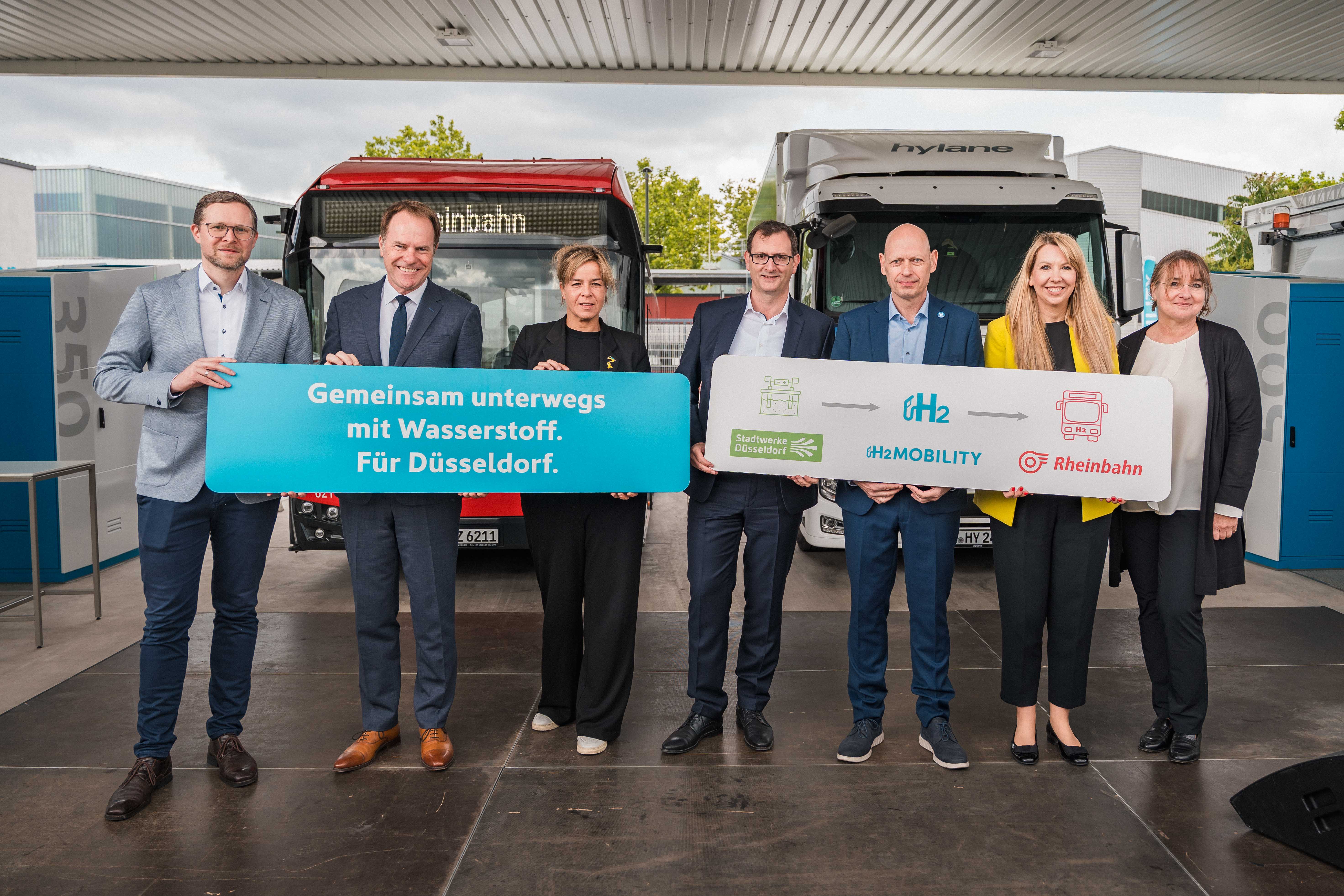 Düsseldorf, 26 May 2025 | H2 MOBILITY, together with Rheinbahn and Stadtwerke Düsseldorf, today inaugurated Europe’s most powerful hydrogen refuelling station. The launch was attended by Mona Neubaur, Minister for Economic Affairs of North Rhine-Westphalia, Düsseldorf’s Lord Mayor Dr Stephan Keller, and Dagmar Fehler, Spokesperson and CEO of NOW GmbH, which coordinates the German Federal Ministry for Digital and Transport’s funding programme.
Düsseldorf, 26 May 2025 | H2 MOBILITY, together with Rheinbahn and Stadtwerke Düsseldorf, today inaugurated Europe’s most powerful hydrogen refuelling station. The launch was attended by Mona Neubaur, Minister for Economic Affairs of North Rhine-Westphalia, Düsseldorf’s Lord Mayor Dr Stephan Keller, and Dagmar Fehler, Spokesperson and CEO of NOW GmbH, which coordinates the German Federal Ministry for Digital and Transport’s funding programme.
The new facility on Höherweg sets new standards for hydrogen mobility, with a daily capacity of up to five tonnes of hydrogen—significantly exceeding the performance of first-generation hydrogen refuelling stations in Germany. Thanks to proprietary high-performance technology, up to three vehicles can be refuelled simultaneously, including buses, trucks, passenger cars and light commercial vehicles. This pioneering project is made possible by a close partnership between H2 MOBILITY, Stadtwerke Düsseldorf and Rheinbahn, who have jointly implemented hydrogen production, infrastructure and demand within a single integrated concept.
Christian Hirte, Parliamentary State Secretary at the Federal Ministry of Transport (BMV): “The opening of Europe’s most powerful hydrogen refuelling station is a strong signal for the ramp-up of hydrogen mobility in Germany—and for the cooperation of committed local partners. With our funding, we are providing targeted impetus for the development of regional hydrogen ecosystems that enable innovation, create added value locally and strengthen Germany’s technological competitiveness. Because one thing is clear: we can only achieve our climate targets with innovation, infrastructure and cooperation—and that is exactly what this project stands for.” The state government of North Rhine-Westphalia views the project as a key milestone in the decarbonisation of the transport sector. Mona Neubaur, Minister for Economic Affairs and Climate Action, commented: “In areas that are difficult to electrify—especially where battery-electric drives reach their limits—hydrogen helps reduce emissions. Hydrogen-powered vehicles offer key advantages in public transport and heavy-duty freight thanks to short refuelling times and extended ranges. To ensure fuel cell buses and trucks become a practical reality, we need affordable vehicles, a dense network of hydrogen refuelling stations and sufficient supplies of green hydrogen. The state is actively advancing this infrastructure, supporting hydrogen refuelling stations for heavy-duty vehicles and launching market ramp-up initiatives such as ‘1,000 Fuel Cell Buses NRW’ and ‘HyTrucks.NRW’—important steps towards climate-neutral mobility.” The expansion of hydrogen mobility in North Rhine-Westphalia is supported by NRW.Energy4Climate, the state energy agency, which plays a central role in developing regional hydrogen ecosystems. The new station is a key component of Düsseldorf’s urban mobility and climate protection strategy. The city has set an ambitious goal to become climate-neutral by 2035. Lord Mayor Dr Stephan Keller stated: “The launch of this high-performance hydrogen refuelling station on Höherweg demonstrates that Düsseldorf is on the right path toward our goal of achieving climate neutrality by 2035. By consistently strengthening public transport, we are offering increasingly viable alternatives to private vehicle use. The deployment of hydrogen and electric buses within the Rheinbahn fleet, along with the necessary infrastructure, is a win for both climate protection and modern urban mobility. I would like to thank all partners involved.” Frank Fronzke, Managing Director and COO of H2 MOBILITY, added: “This station marks a milestone for hydrogen mobility in Europe. It represents a new generation of hydrogen refuelling stations, with more dispensers for 350, 500 and 700 bar, greater hydrogen volumes and significantly higher performance. Our innovative high-performance technology enables fast, flexible refuelling for buses, trucks and passenger cars, making a tangible contribution to the transport transition. This project demonstrates how cooperation between business and government can accelerate innovation.” Climate-Friendly Hydrogen from the Outset Until the Stadtwerke Düsseldorf electrolyser is operational next year, the hydrogen refuelling station will be supplied with renewable hydrogen (RFNBO) from a certified source powered exclusively by renewable electricity. As such, the hydrogen mobility solutions at this site have been designed with sustainability in mind from day one. Beginning in 2026, the station will be directly supplied with locally generated hydrogen produced using energy from waste via the Stadtwerke Düsseldorf electrolyser. The electricity for this process comes from the biogenic fraction of the utility’s waste-to-energy plant—creating a local, circular energy loop and a flagship example of urban sector coupling. This regional energy cycle will significantly and sustainably reduce emissions. Julien Mounier, Chairman of the Board of Stadtwerke Düsseldorf, noted: “I am pleased that we have jointly developed and implemented this project. What sets this hydrogen refuelling station apart is that from next year, it will be supplied exclusively with hydrogen produced locally by Stadtwerke Düsseldorf. To that end, we are constructing a two-megawatt electrolyser directly behind the station. This enhances regional value creation and eliminates CO₂ emissions associated with hydrogen transport. Together, we are making a substantial contribution to decarbonising Düsseldorf’s transport sector.” For Rheinbahn, which already operates 20 hydrogen buses as part of its decarbonisation strategy, the new hydrogen refuelling station near the Lierenfeld depot represents vital infrastructure. Annette Grabbe, Member of the Executive Board of Rheinbahn, stated: “Hydrogen is an essential component of our strategy to reduce CO₂ emissions. We are investing strategically in this future technology to transform public transport in Düsseldorf and the surrounding region. The new hydrogen refuelling station represents another milestone in our journey toward zero-emission mobility. Its commissioning ensures that we are now optimally positioned to refuel our hydrogen buses flexibly and efficiently for reliable operations. The vehicles have already proven themselves in daily service—our drivers value their comfort and performance. Together with our strong partners H2 MOBILITY and Stadtwerke Düsseldorf, we are driving the mobility transition forward and making tangible progress towards our regional climate neutrality goals.” A New Generation of Hydrogen Refuelling Stations As H2 MOBILITY celebrates its 10th anniversary in 2025, the company looks back on a decade of pioneering work in developing a nationwide hydrogen refuelling network. Under the motto TOGETH2ER, H2 MOBILITY is recognising the partnerships that have made hydrogen mobility possible. The new station in Düsseldorf symbolises the progress made over the last ten years: a new generation of hydrogen refuelling stations tailored specifically to the needs of logistics and public transport. With higher performance, shorter refuelling times, and integration of renewable hydrogen sources, H2 MOBILITY is setting new benchmarks for sustainable mobility in Europe. The hydrogen refuelling station and electrolyser are being funded under the “Market Activation Measures” guideline as part of Phase 2 of the National Innovation Programme for Hydrogen and Fuel Cell Technology (NIP2), managed by the Federal Ministry for Digital and Transport (BMDV). The funding programme is coordinated by NOW GmbH and implemented by Project Management Jülich (PtJ). Funding amounts total €3,137,000 for the hydrogen refuelling station in Düsseldorf-Höherweg (HyLight3) and €1,212,000 for the electrolyser. H2 MOBILITY H2 MOBILITY is a pioneer in the development of public hydrogen refuelling infrastructure and Europe’s largest operator of hydrogen refuelling stations. Its areas of business include technical development, financing, planning, construction, marketing and operation of hydrogen stations. The company is also increasingly active in the services sector, offering consulting, station construction and operations, calibration and quality assurance. Founded in 2015 as a project company to promote hydrogen as an emission-free fuel for road transport, H2 MOBILITY transitioned in 2022 into a long-term, commercially focused enterprise. Its mission is to contribute to the energy transition in transport through high-performance hydrogen refuelling solutions. H2 MOBILITY aims to transition fully to renewable hydrogen by 2028. About Stadtwerke Düsseldorf Stadtwerke Düsseldorf AG has been providing electricity, gas, water, and district heating services for more than 150 years and is responsible for waste disposal in the state capital. As one of Germany’s largest municipal utilities, the company supplies around 600,000 customers. With over 3,100 employees, Stadtwerke is a major employer in Düsseldorf, embodying both tradition and innovation. Its operations are consistently aligned with evolving market needs and the demands of a growing metropolitan region. About Rheinbahn Rheinbahn is more than just a public transport provider—it is a vital link for an entire region. Since 1896, Rheinbahn has connected people, places, and daily life. Today, the company serves Düsseldorf, the district of Mettmann and the Rhein-Kreis Neuss, transporting over 500,000 people daily. With more than 3,700 employees from 61 nations, Rheinbahn is one of the largest employers in the region. Its 320 trams and light rail vehicles and nearly 500 buses operate 135 lines across approximately 570 square kilometres. Serving over 1,700 stops, Rheinbahn symbolically circles the Earth three times each day—reliably, safely, and sustainably. The company offers human-centred mobility that bridges generations, backgrounds, and urban and rural spaces. Press contact: H2 MOBILITY: Daniela Dietz – presse@h2-mobility.de Stadtwerke Düsseldorf: Tanja Albrecht – talbrecht@swd-ag.de Rheinbahn: Heike Schuster – heike.schuster@rheinbahn.de Image: Copyright (c) H2 MOBILITY; from left to right:- Martin Jüngel, Managing Director and CFO, H2 MOBILITY
- Dr Stephan Keller, Lord Mayor of the City of Düsseldorf
- Mona Neubaur, Minister for Economic Affairs, Industry, Climate Action and Energy of the State of North Rhine-Westphalia and Deputy Premier of North Rhine-Westphalia
- Julien Mounier, Chairman of the Board of Stadtwerke Düsseldorf, Stadtwerke Düsseldorf
- Frank Fronzke, Managing Director and Chief Operating Officer COO, H2 MOBILITY
- Annette Grabbe, Member of the Executive Board, Rheinbahn
- Dagmar Fehler, Spokesperson and CEO, NOW GmbH
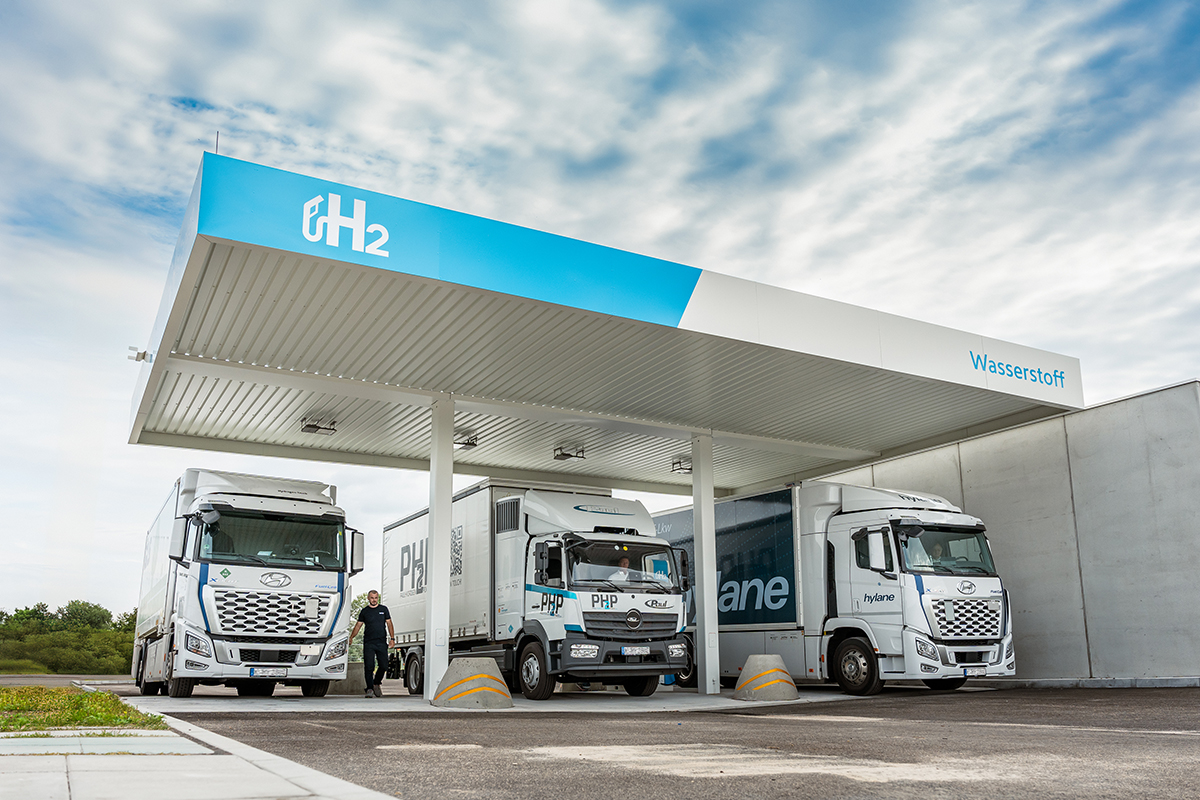
Hydrogen demand from the 350-bar commercial vehicle segment continues to grow. Numerous companies in Germany are already operating hydrogen-powered lorries in daily service—such as the Hyundai XCIENT Fuel Cell. Many rely on flexible rental models like those offered by Cologne-based company hylane. Other providers, such as PAUL Nutzfahrzeuge, also offer production-ready, subsidy-eligible hydrogen trucks for purchase or lease, including the PH2P Truck. (c) H2 MOBILITY
Documents
Pictures
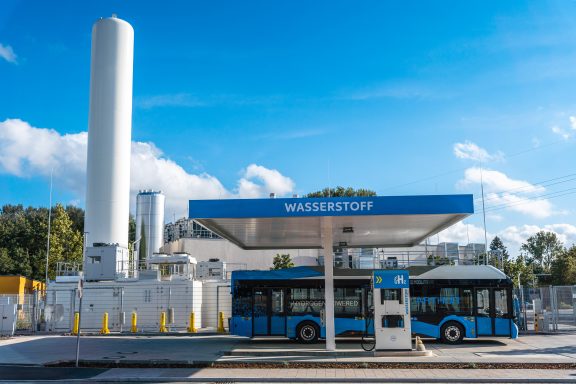
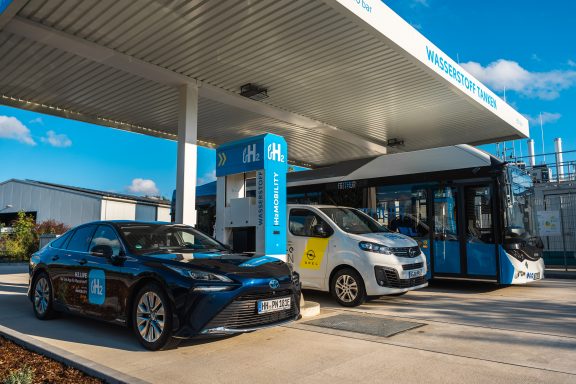
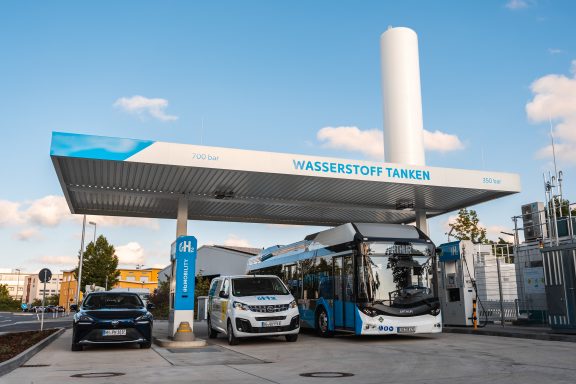
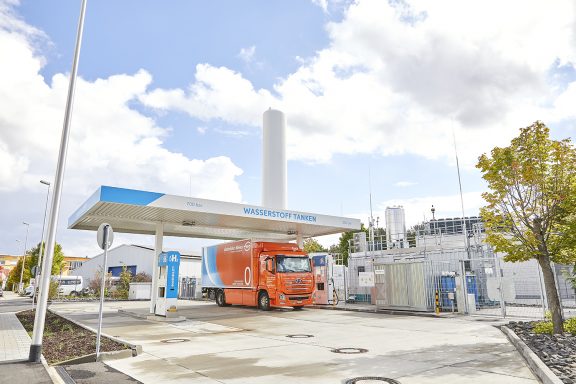 Gebrüder Weiss tanken in Erlangen, Hyundai XCient
Gebrüder Weiss tanken in Erlangen, Hyundai XCient
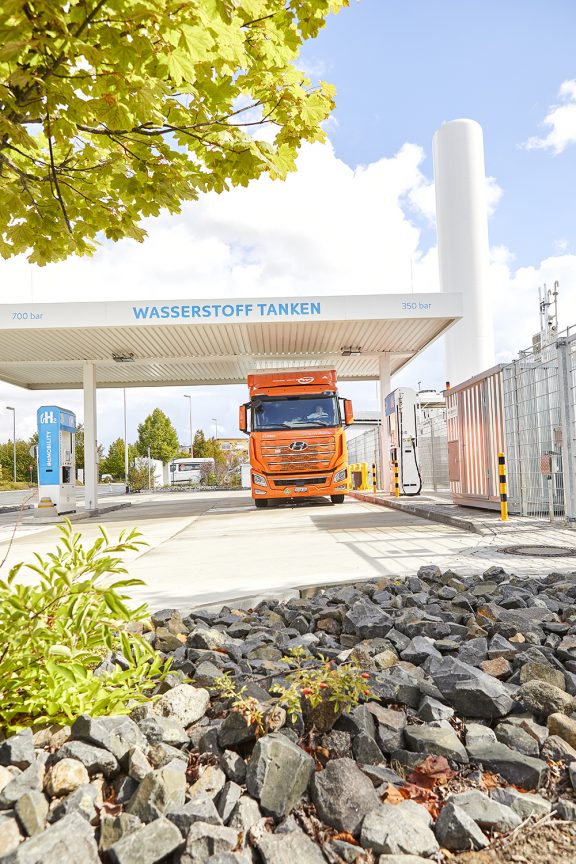 Gebrüder Weiss tanken in Erlangen, Hyundai XCient
Gebrüder Weiss tanken in Erlangen, Hyundai XCient
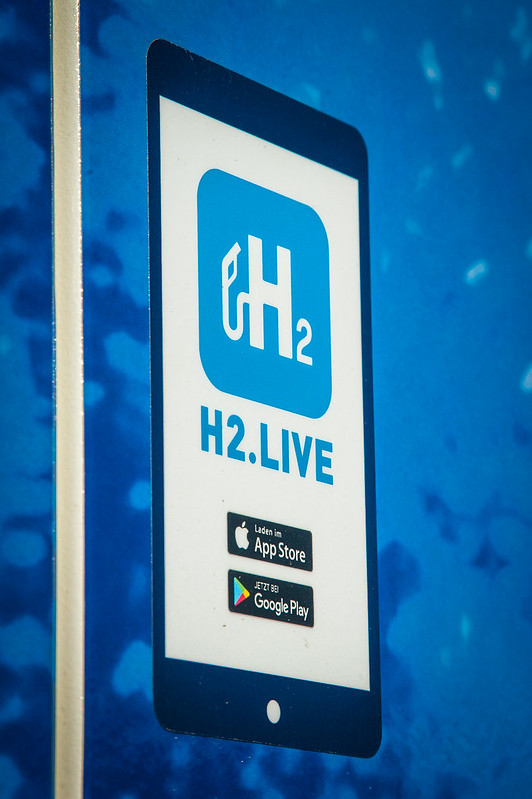 H2.LIVE
H2.LIVE
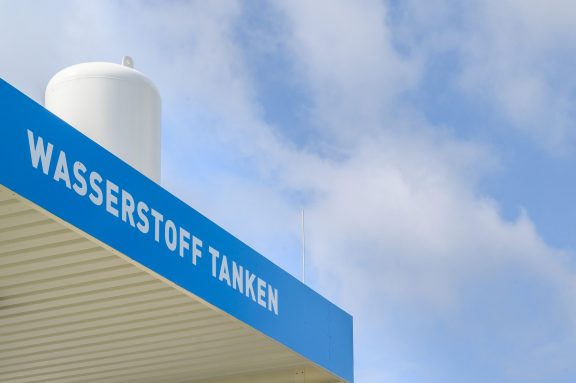 Wsserstoff tanken
Wsserstoff tanken
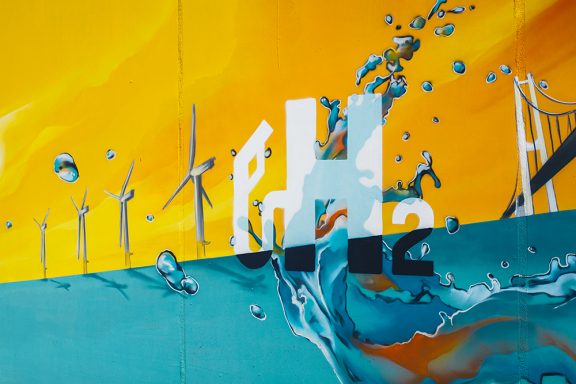 Graffiti
Graffiti
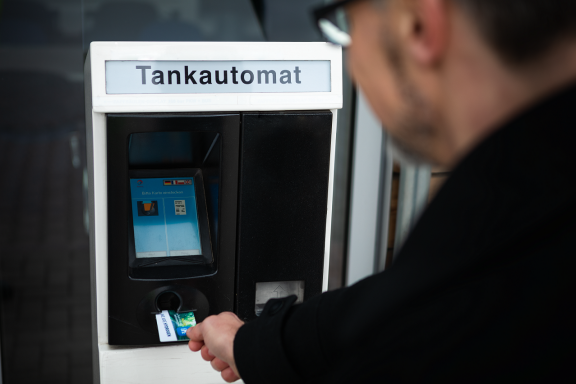 H2 MOBILITY Card
H2 MOBILITY Card
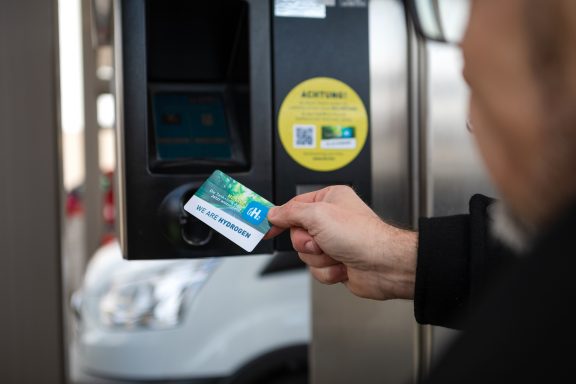 H2 MOBILITY Card
H2 MOBILITY Card
 H2.LIVE App
H2.LIVE App
